#st music analysis
Text
So (because I cannot go three seconds without noticing new little things that tell the wider story in this show):
Let’s talk about how the music that plays during the S3 Byler fight is the exact same music that plays during the S4 conversation Mike & Dustin have with Lucas as they walk to class after the pep rally—
—and how that parallel gives us insight not only into how Mike (and his devotion to Will) has evolved between seasons 3 and 4….but also how The Duffers are evolving Mike as a character in the wake of the "conflict" of forced conformity they introduced in S3.
To start: here are snippets of both scenes where “Not Kids Anymore” plays, both in Season 3 and Season 4.
Now, even though Mike is present in both scenes, it’s not entirely obvious why these things would be parallels, given the radical difference in tone. That said: when we look at these scenes in their wider contexts, we see that they are both exploring the exact same issue, only with Mike on opposite sides of the convo each time—
—namely, whether or not its worth it for Mike to embrace conformity, given that there are behaviors/roles he is meant to fill when trying to keep up with being normal/growing up...and "society" says that DnD / nerdiness (and a refusal / lack of desire to participate in performative relationships) stands entirely apart from that.
Let me see if I can explain.
First: these things are parallels because they are asking us to compare the Mikes in each situation—to notice how he took Will’s words to heart, and decided on some level that Will was right, not him. How do we know? Because in the time between these two convos (aka the rain fight and then the first few episodes of S4), we learn that Mike has made a point to address and rectify all criticisms Will had of him & his behavior during the rain fight.
As of the very first episode of S4, we are shown that Mike is 1) paying attention to both the party/DnD the way Will criticized him for not doing (to the point of calling out Lucas for not prioritizing it the way he now wants to)—
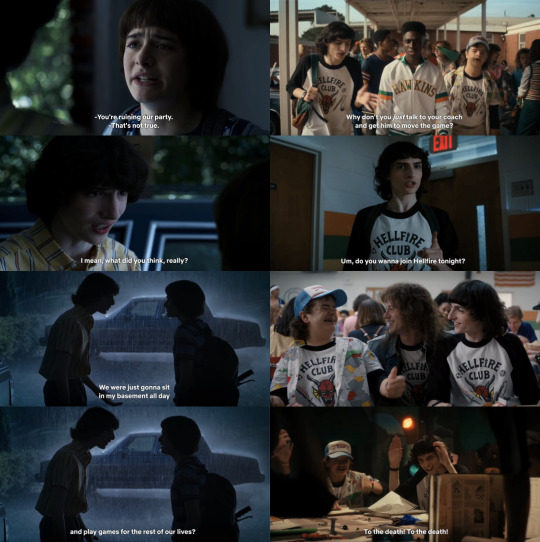
—2) he is focusing on keeping closeness with Dustin (even to the point of judging Lucas for not doing the same), because Will accused him of ignoring Dustin as readily as he ignored him—
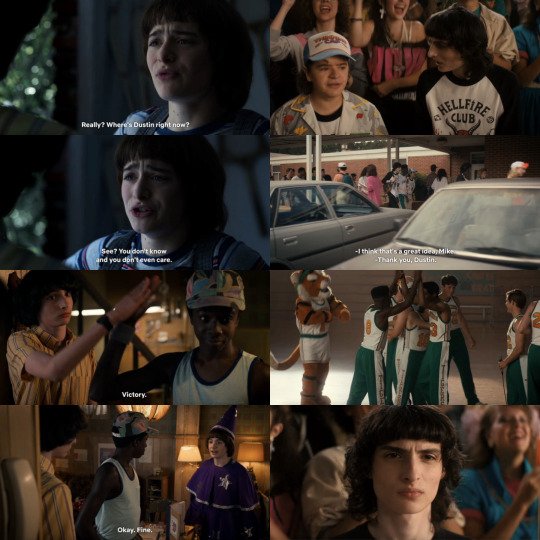
—and 3) he has entirely stopped "swapping spit" with El (to the point of removing her from a hug at the airport, kissing her on the forehead...and then never kissing her again lmao) while letting his relationship fall apart without much of a fight…right before apologizing to Will for letting El get in the way of their time spent together in the first place.
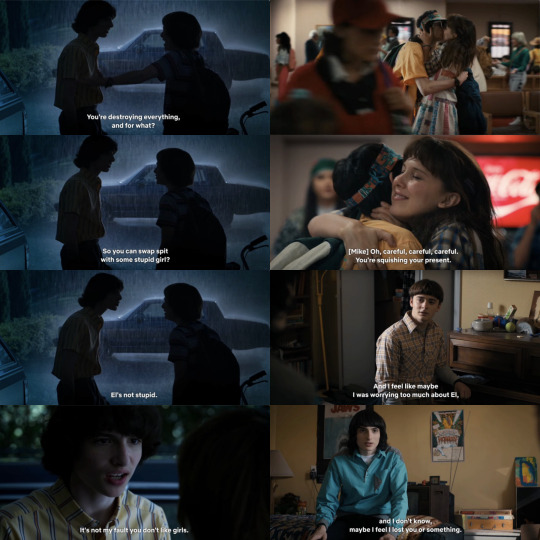
Basically: even though he is still struggling in many ways to defend himself from being bullied/being an outcast by hiding behind his relationship with El (the same way Lucas is with “being popular” and basketball), we can see that Mike has made clear strides towards embracing the sides of him that aren’t conformist, which is reflected in all of his decision-making in Will's absence.
Though Mike is getting older and the party “aren’t kids anymore,” them paralleling these scenes is showing us that Mike, at least on some level, has realized that growing up is not at odds with embracing the things he enjoys & his various identities, whether that be through playing DnD—
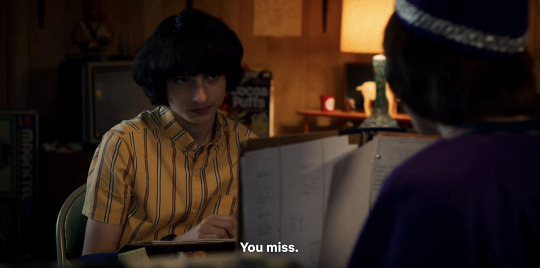
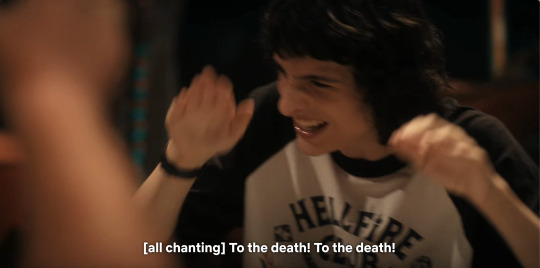
—wearing clothes he chose on his own—
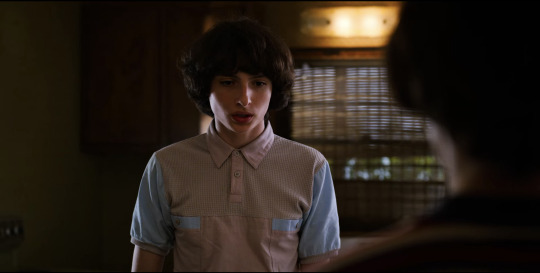

—or willingly choosing closeness with Will over the performance of relationships with girls (the same way Will already had in Season 3, and Dustin reflected as well).
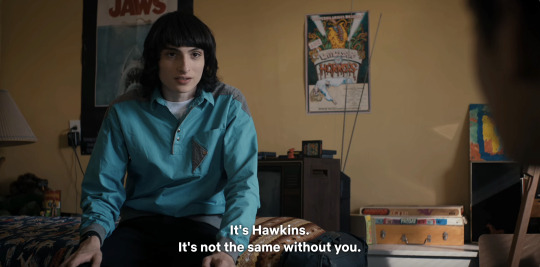

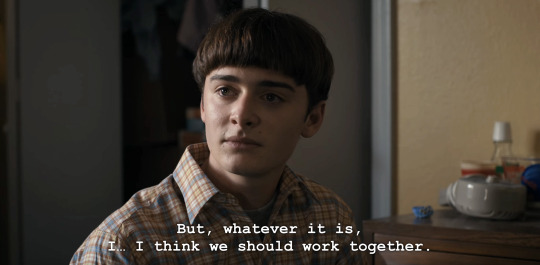
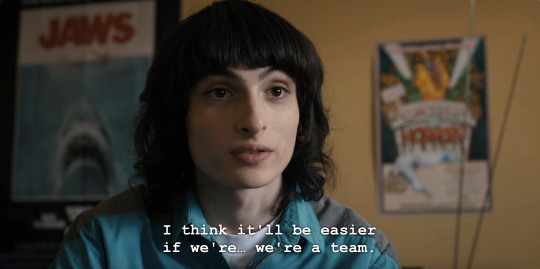
Now...this isn't to say that he's entirely succeeded at the task, given how many times we see him fumble through actually implementing these changes/revelations in himself, whether with clothes (hello 'shitty knockoff'), embracing his actual interests, or even letting himself want to admit he wants to be with/around Will and not El—
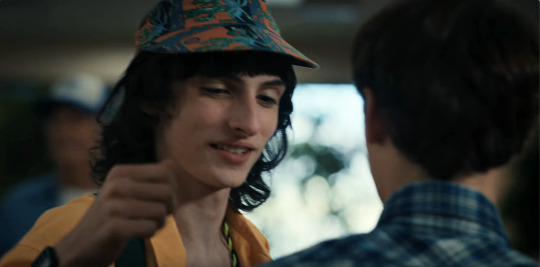
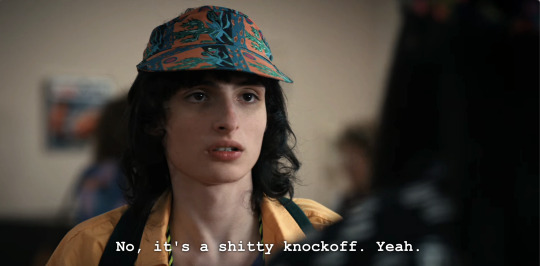
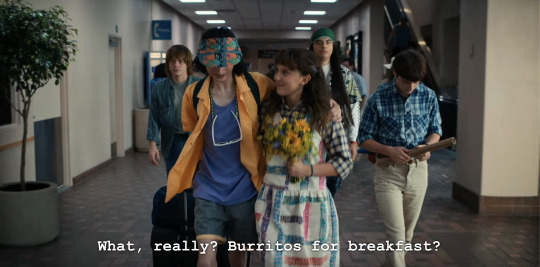
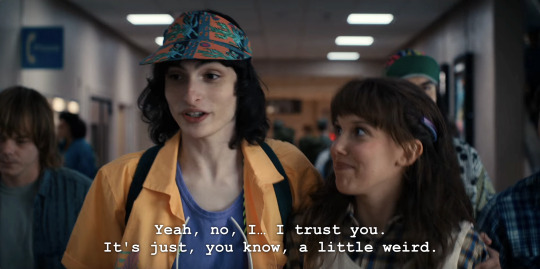

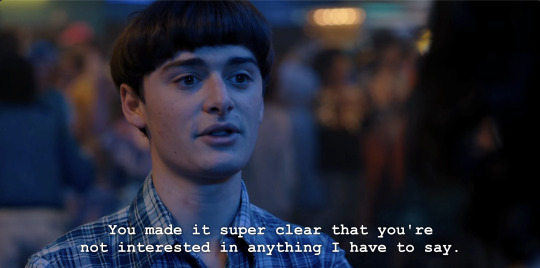
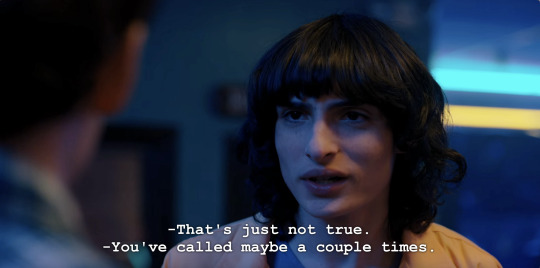

—on top of the fact that I've already talked (many, many times) about how the journey of "feeling like you lost" the Duffers took us on had Mike ending up in a position where "conformity" temporarily wins, how that plays into his relationship with El versus Will, and why it matters for his character even outside of his queerness.
Still: I think this parallel in particular is important to understanding his character because it rules out any idea that Mike is somehow oblivious rather than intentionally working through to the changes happening in himself, whether they be in regards to him re-choosing DnD, making decisions about his clothing for himself...or wanting to be closer to Will / not participate in "liking girls," which is what he gets projection-mad at Will about during the rain fight.
tl;dr: Mike has realized on some level that he wants to be more like / closer to Will than his S3 "conformity" self—and the war we see on his face throughout the season in conversations with Will has a lot to do with that, among other things.
This musical parallel in particular draws attention to the fact that there have been changes happening within Mike that he sees and recognizes—he just "lost" like every other character this season, aka failed at walking into a more secure sense of self / out of his "conformist" relationship in its entirety...which we'll resolve in S5. :)
#byler#anti mlvn#mike wheeler#will byers#mike wheeler core#this could have gotten SO MUCH LONGER and I know I'm gonna do a companion piece on lucas right after this but lmao I had to START SOMEWHERE#like? one day I'm just gonna have to write a fucking book on mike wheeler because I have SO MUCH TO SAY LMAO#my st commentary#st parallels#stranger things#st music analysis
394 notes
·
View notes
Text
cannot believe that some people think that barb was straight and did not have a crush on nancy. did we both watch the same scene of “yellow ribbon” playing between them in the car. a song about someone who isn’t sure if their love is requited/is afraid of being rejected and is too afraid to look/see for themselves if it so they ask somebody else to? aka being afraid of rejection especially being queer??
also having thoughts about how yellow ribbons have been used as a symbol for suicide awareness AND as the original symbol of the aids crisis before the red ribbon was used in 1991 + how there’s definite ties to vecna preying on suicidal people but also a narrative tie to vecna and peoples’ disappearances as a representation of suicide when the supernatural elements are removed from the story.
and how barb felt rejected that night (just like the song, she was afraid of rejection) and how its only the first half of the song that we hear, NOT the half that talks about how the singer ISNT rejected. because barb IS rejected.
and the last line of the song (which we don’t hear in the show) is “i’m coming home” + the singer is ONLY coming home BECAUSE his love is requited, otherwise he says that he’d stay on the bus and not go home-> nancy tells barb to go home but she never does, because she dies. just like how we never hear that “i’m coming home” lyric of the song because barb is rejected and therefore, like what the singer said, she’s not going home. (going home = not rejected)
this also has implications for byler! in s2, mike tells will that he’s going to take him home, and he DOES, but he takes him to HIS house. will DOES make it ‘home’ in that scene, unlike barb, but he also technically makes it home during his disappearance, even though he vanishes after (and even if the whole house was a vecna vision and not the real house, visually, there’s still showing him going home).
and so if going home = not rejected/requited love, then byler is requited.
barb didn’t make it home, despite nancy telling her to go home. barb died in the upside-down. barb’s love was unrequited.
will made it home. will did not die in the upside-down. will’s love is requited.
like barb absolutely had feelings for nancy (and imo is definitely a lesbian) and yet i see so many people esp on twt denying it and saying that she’s just straight and jealous of nancy being with steve and that barb was in the wrong. when will the ga realize that queerness has been rooted in this show since the beginning and isn’t just something they can ignore when it suits them??
#stranger things#st soundtrack#st music analysis#barb holland#byler#byler analysis#mike wheeler#will byers
526 notes
·
View notes
Text
Sleep Token analysis.


A couple of people were struggling to find some of my older analysis posts, so, here is a masterlist!
Euclid (TMBTE) - whole song analysis
Part one -> Title and meaning
Part two -> Line by line analysis part one
Part three -> Line by line analysis part two
Part four -> Musical/instrumental notes
Part five -> The Night in Sleep Token
Part six -> Conclusion
SFX in Sleep Token - all albums
Part one -> One, Two, TWTYW and Jaws
Part two -> Sundowning and TPWBYT
Part three -> TMBTE
Small lyric analysis
Distraction -> It's too late for me
Calcutta -> Whole again, for just a moment
Blood Sport -> Choke up chunks of my own sin
Jaws -> Show me where the delicate stops
Give -> Give in again
Acensionism -> Lipstick, chemstrails
Jericho -> Enough to make the dead switch graves
Higher -> I look for scarlet and you look for ultraviolet
Higher -> I am a danger
Miscellaneous
Levitate -> A warm hug
Teeth Of God -> Om nom nom
Vessel in the Metal Hammer mag -> Vessel Christ anyone?
Missing Limbs -> Oddly comforting
#thought I'd put it all together so it's easier for people to find#(and also for me to cross-reference in the future)#that Euclid analysis is my magnum opus so if anybody who's reading this decides to read it get some popcorn and a drink because you're in -#for the long haul lmfao#I want to do more little analysis bits because they make me happy#sleep token#st#mel's rambles#sleep token analysis#music analysis#music and lyrics#lyric analysis
29 notes
·
View notes
Text
The Will Byers Full-Circle Theory
Stranger Things 4, vol. 1 spoilers ahead + me putting my literature minor to use
Let’s talk about Will Byers as a character, Vecna’s curse, and the Mind Flayer. This theory will have a part 2 relating to my Byler-centric ideas about how this could all play out in vol. 2 (and how I think it will trickle into season 5), but for now I’ll focus on the theory itself.
Part 2 of this theory: Will Byers’ Vecna Song
Mirroring in Stranger Things
Stranger Things references the effects of mirroring throughout the series in multiple avenues, both within the text and visuals, along with the subtext. Most obviously may be the Upside Down, which we know as a twisted / dark mirror of Hawkins’ reality. Within season 4 (and previous seasons) a lot of the shots themselves further the idea of mirroring: El in the rainbow room, the biking sequence, the end of ep. 7 with the rope between realities, etc. This shows up in characters as well, like Henry Creel (001) who is mirrored and realized within Vecna himself. Mirroring is a common storytelling device which is used to draw comparisons between characters, plot lines, places, and other elements in a story. We clearly see this within much of Stranger Things.
I’ve seen some people point out Henry Creel as a mirror or foil for Will due to some similarities in their character traits. They’re both sensitive and drawn to interests seen as odd or even dark by the larger world (black widow spiders which Henry emphasizes with despite their links to death; D&D for Will, which is seen as silly by some, and even potentially Satanic by the town during season 4). They also both have a talent for drawing, and are shown drawing these “unusual interests.” These similarities could be used as a way of building empathy towards Henry (making his motives more understandable) by drawing comparison to an established outcast character who we know to be good. It’s their actions and the ways they react to being outcasts that set them apart. But the similarities could also be building towards a full-circle moment of Will confronting Vecna in one way or another. More on that later.
Will and the Upside Down
Will has a connection to the Upside Down like nobody else in the series, which further sets him apart. Although others are shown as having connections to the Upside Down, the entire story began because Will went missing: lost in a mirror dimension. A parallel world. In season 1, Will is frightened and sings to himself in Castle Byers (a location which symbolizes his childhood innocence). With the help of his friends, Will is returned to reality and the real world Hawkins. But as we know, he is scarred from his experience there, dealing with “True Sight” and a deepening connection to the Mind Flayer in season 2. In season 2, he’s the only character who has this kind of connection to the Upside Down. Even El, who we now know to be involved in the creation of the original gate, doesn’t have such an intimate tie to it. Although Will is no longer possessed in season 3, his connection to the Upside Down continues as he is able to sense the presence of the Mind Flayer. Then the gate is destroyed, the Meat Flayer is destroyed, the Byers move away, and all seems well.
The Mind Flayer
Now, I want to create a little side-note about Vecna vs. the Mind Flayer, because I know there is a lot of discourse about which is the true big bad of the series. Personally, I see the Mind Flayer as the real villain pulling the strings. I think season 4 pushes this idea because we know the Upside Down existed before Vecna/Henry Creel/001 were banished there. The Mind Flayer seems to be a much larger, more cosmic deity who is quite Lovecraftian and clearly not human. There are lots of other reasons for this that I could elaborate on in another post. But for now the main takeaway is that I agree with Dustin about Vecna being the top general of the Mind Flayer, who acts in accordance to the true villain.
If the Mind Flayer is the real villain, then Will’s connection to it is even more crucial and powerful. This is potentially the most powerful being in the entire series, and Will has a tie to it like no other character.
Vecna’s Curse
Like many others, I think Will will (ha) fall under Vecna’s curse in vol. 2. In fact, I think it’s inevitable for this to happen. It wasn’t until the gate closed that Will lost his ability to feel the presence of the Mind Flayer (and its soldiers), and then he moved away. Now, Will is likely going back to Hawkins where we know there is not just one opening to the Upside Down, but at least three presently. In other words, the Mind Flayer is still in there, and when Will returns I believe that Vecna (operating within the Mind Flayer’s hive mind) will use the “spell” on him. Vecna preys on teenagers who have trauma in their pasts, which Will certainly does. Out of the Party as a whole, I think he’s the person most likely to be targeted next.
Vol. 1 reveals that music has the power to block out Vecna’s curse. Will has an obvious connection to music in general, throughout the entire series, and especially to The Clash’s “Should I Stay or Should I Go.” Will himself even sings the song multiple times when he’s in the Upside Down and it seems to ward off the monsters, if even momentarily. If Will does fall under the curse as I suspect, then I think it would be the most perfect full-circle moment for the series to bring back the song. Whether Will himself sings it, the Party plays the song, or Mike sings it to Will (part of my Byler-centric speculation), if he’s impacted by Vecna’s curse, it seems only natural that this would be the song he’s most connected to. In a lot of ways this would mirror the beginning of the entire series, with Will trapped in the Upside Down, listening to and singing The Clash to get himself through the traumatic experience.
But what does it mean that Will has a stronger connection to the Mind Flayer than everyone else? Would this change the way Vecna’s curse impacts him? I think it potentially could. I don’t personally believe they will kill off Will in vol. 2 (it doesn’t really make sense for his character arc), but I do think the curse could play out differently in him than the others. There are lots of things that could happen (I could speculate possibilities all day). Some see a dark Will arc in the making, with Will as the final villain, but I personally don’t see this as likely. One option I could see happening is that Will is stuck in the Upside Down at the end of season 4, leading into season 5 with him in a similar predicament to the start of the series. Perfectly mirroring the events of season 1.
My Final Thoughts
I love the idea that season 5 is a bigger and darker version of season 1 revolving around Will and taking down the Mind Flayer for good. I think it would be a phenomenal end to the series, and the story would have a cyclical effect that would resemble the way the characters, relationships, dialogue, and locations themselves are oftentimes mirrors for each other.
Even if season 4 doesn’t end with Will stuck in the Upside Down, I think Will in season 4 being caught within Vecna’s curse and having to fight to get himself out would bring a lot of closure to his trauma. It would also be a general amazing callback to the first season, especially if we see Will alone in the Upside Down with “Should I Stay or Should I Go” playing out. So overall, I think vol. 2 will conclude with a direct mirroring of Will’s experiences in the previous seasons, building on his connection to the Mind Flayer and creating a satisfying cyclical storyline.
#st 4 spoilers#stranger things#stranger things season 4#st 4#stranger things season 4 spoilers#will byers#vecna#vecna's curse#the upside down#will byers mirror#byler#byler is endgame#stranger things music#stranger things music theory#stranger things theory#will byers analysis#the mind flayer is behind everything#redshoes-blues
952 notes
·
View notes
Text
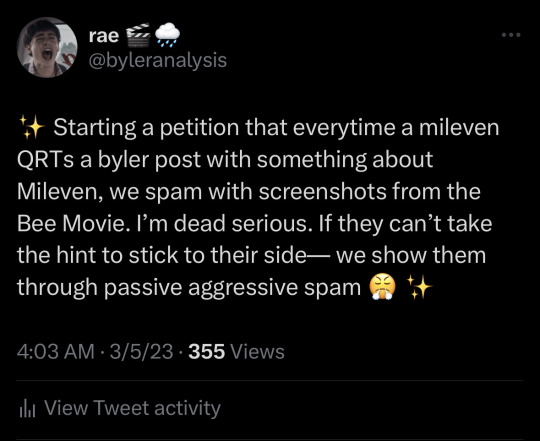
Twitter/Tumblr Bylers, it’s time to rise. The revolution is now.
Are you tired of unnecessary comments about mileven under your posts about byler?
Are you tired of the same cyclical useless drama in the stranger things fandom?
then I introduce to you: spam the replies that show no fandom etiquette with screen caps from the bee movie so that they take the hint for how annoying it is to get stupid replies while also not engaging in personal attacks or drama.
what do you say?
retweet. spread the word. it’s time to make this fandom fun once again.
#byler#stranger things#byler crumbs#byler cinematography#byler analysis#mike wheeler#will byers#s4#mike wheeler i know what you are#wiseheart#miwi#st analysis#byler music#byler prompt
123 notes
·
View notes
Text
“Hammer to fall” theory
“Hammer to fall” is a song by Queen which is about accepting that death is something you can’t fight or escape. “Waiting for the hammer to fall” basically translates to “Waiting for death to get us” because it will. And that’s not a bad thing but it’s simply a part of life.
This song is actually used in a scene in Stranger Things. In Season 2 episode 6 “The spy” Dustin needs help from Steve because of d’art and on the drive to Dustin’s house “Hammer to fall” plays on the car’s stereo:
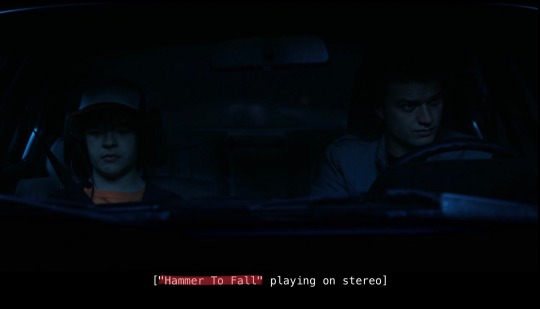
[i can only screenshot the subtitles so I had to edit the picture in]
It seems very insignificant. We only hear a couple of words and then the music descends pretty quickly as Steve asks Dustin if he’s sure that d’art isn’t just a lizard.
But there’s one line that kinda threw me off and so I’ve been lookin into the lyrics a little more and I feel like “hammer to fall” might’ve actually been supposed to be foreshadowing for specifically the last scene in s4 and possibly for things that will happen in s5
[although we don’t know that ofc but I’m just theorizing]
Let me elaborate
First off: the fact that the song revolves around waiting for death to get us kinda correlates with Henry’s speech about how people live their lives with no purpose other than to die in the end.
And now let’s look at some of the lyrics:
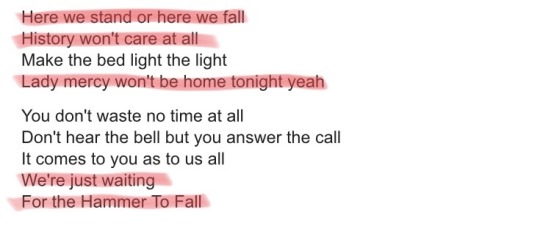
“Here we stand or here we fall / history don’t care at all”
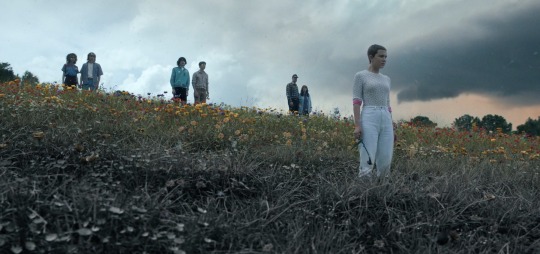
->Hawkins is where it all started and Hawkins will be where it all ends. Some will survive and some will die there. And when the final battle will ensue their history of fighting the Upside Down won’t really matter. It doesn’t matter how many times they’ve fought it before because the final battle will be ten times worse.
“Lady Mercy won’t be home tonight”
-> the battle is going to be merciless! They won’t get an easy way out! They probably won’t all survive! Vecna is going to be cruel to them like he’s not been before!
“We’re just waiting for the hammer to fall”
-> the end of season 4 marks the moment the characters know that it’s time to await death again!

“In the shadow of a mushroom cloud”
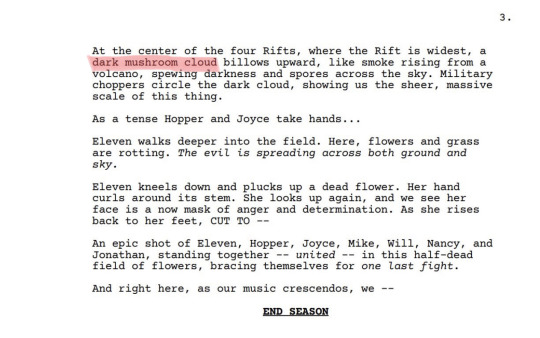
-> According to the official script of s4’s final scene, they’re awaiting death in the shadow of a mushroom cloud.
“What the hell are we fighting for? / just surrender and it won’t hurt at all”
-> This is a nod to how Vecna is mercy killing his victims. They shouldn’t fight it because Vecna is putting an end to their suffering. It won’t hurt if they just surrender! And I feel like this could also be foreshadowing to how Vecna might try to get specifically Will to surrender to him next season.
-> We also have this:
the song “Never surrender” is actually a song about never giving up but the specific lyrics they chose for this scene are kinda depressing. Mike is also singing along so the meaning applies to him. We also get another making out scene later in the same episode with the song “Can’t fight this feeling” and since both songs are used in the same context it’s safe to say that there’s a connection. Mike has a hard time fighting his feelings for Will / fighting the fact that he’s gay but he can never surrender to his feelings because he’ll get abandoned by everyone if he does. He will get hurt if he does. Therefore “Just surrender and it won’t hurt at all” might be foreshadowing the fact that when Mike stops fighting his feelings and just surrenders to them instead in s5, things will actually change for the better. It won’t hurt at all because he’ll realize that he’s so loved, that there’s so much love in his life!
-> The connection to Mike could also foreshadow that Mike will be targeted by Vecna because of the fact that he can never surrender to his feelings. He’s lost and on his own with his problems which makes him an easy target. Now the question is if it’s also foreshadowing the fact that Mike will surrender to Vecna cause it won’t hurt at all.
“Lock the door […] / baby now your struggle’s all in vain”
-> this line also reminded me of Mike. It reminded me specifically of how Mike locked the closet door by giving his monologue to El which therefore made his struggling throughout the season end in vain!
-> and for s5 Mike’s struggle with his sexuality and also his struggle with his mental health are all in vain, his arc doesn’t lead anywhere, there’s no payoff IF he does surrender to Vecna. And I feel like this might be foreshadowing that we get a fake death for Mike next season. We’ll think his arc is all in vain but we’ll actually get the payoff in the end because Mike didn’t actually die.
“It’s gonna fall”
-> people are going to die and Hawkins is going to fall!
-> Mike is going to have a fake death
-> we also have this:
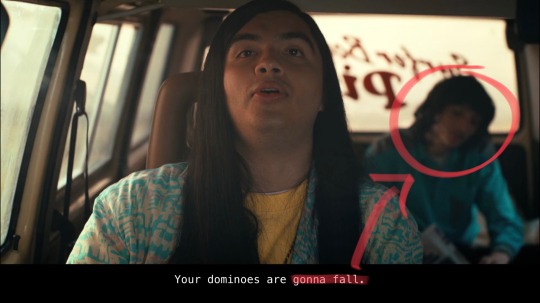
Argyle is talking about how Surfer boy pizza will overthrow Domino’s but Mike is also in the shot so a lot of people have already created the theory that it’s connected to Mike and probably means that Mike and El’s relationship will break apart. That’s it. The dominoes are not gonna fall like in a chain reaction, the domino on the Domino’s logo is gonna fall apart!

The Domino’s logo used to look like the one on the left when stranger things takes place but all throughout the writing of stranger things [so obviously also during the writing of s4] the Domino’s logo looks like the one on the right. See how there’s one blue and one red domino now? And the blue [Mike’s color] has two dots in it while the red one [El’s color] has only one dot. The domino resembles the love triangle! The two in the blue one are Mike and Will and the one in the red is El! It shows that Mike and Will have already emotionally chosen each other but when the domino is finally gonna fall apart, meaning Mike and El will break up and the red part of the domino will separate from the blue part, Mike and Will will have officially and openly chosen each other while El has chosen independence!

And it’s gonna happen! [“it’s gonna fall”]
“[…] waiting for the hammer to fall / […] one more time ”
-> one last season, one last battle, one more time waiting for death to get them!

#i hope this makes sense#i hope i didn’t misunderstand something crucial which makes this all shit#well#byler#byler tumblr#mike wheeler#will byers#stranger things#stranger things theory#st analysis#st theory#st5 theory#st5 speculation#music analysis#byler is endgame#melvin is bones#hammer to fall
78 notes
·
View notes
Text
I'm curious
#ronance#robin buckley#nancy wheeler#ronance brainrot#st poll#st polls#byler polls#byler poll#stranger things polls#stranger things poll#ronance analysis#st music#st soundtrack#stranger things ost#stranger things original soundtrack#tammy thompson#you're a fighter#st3 rewatch#st4 rewatch#stranger things#st theory
21 notes
·
View notes
Text
The Byler x High School Musical Parallel Breakdown
It has shocked me to my core, but there is actually more to this parallel than just the funky little video that blew up on TikTok, and I'm honestly still not sure how to feel about it given that there's a substantial amount of narrative overlap, particularly between Byler s4 and HSM 2, so without further ado, let's get into it brochachos.
Like Kindergarten
Now the first thing I want to talk about here you may have already seen in a recent post of mine, but I think it deserves more attention and analysis, so let's talk about the use of "kindergarten" references in both High School Musical and Stranger Things.
In the first High School Musical movie, Troy takes Gabriella up to the rooftop garden space, which Gabriella refers to as his "private hideout," so that they can talk and be alone. (I want to put a pin in this and talk about the concept of private hideouts parallelism in a bit, but for now let's move forward).
They start to talk about how it's hard to be their respective authentic selves and constantly feel like they're being forced into these archetypal molds, but Gabriella says that when she was singing with Troy, she felt like she was "just a girl," meaning that she didn't have to be anything else in that moment but just herself.

She then sits down on the bench with Troy and asks, "Do you remember in kindergarten how you'd meet a kid and know nothing about them, then ten seconds later you're playing like you're best friends, because you didn't have to be anything but yourself?"
And Troy responds, affirming her question with a "Yeah."
And Gabriella says, "Singing with you felt like that."
Here, it's very clear that Gabriella is being vulnerable with Troy, she's telling him that singing with him made her feel safe and more like herself than she has felt in any of her other schools; she doesn't feel alone when she's singing with Troy, she feels seen.
Now there's a couple places in Stranger Things that I think parallel this conversation, and the most obvious one is Mike's S2x08 monologue recalling his memory of meeting Will.


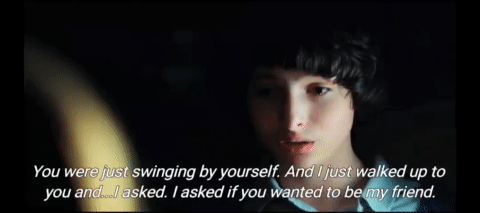
Here, we get Mike saying, "Do you remember the first day that we met? It was...It was the first day of kindergarten. I knew nobody. I had no friends, and...I just felt so alone and so scared, but...I saw you on the swings, and you were alone too. You were just swinging by yourself. And I just walked up to you and...I asked. I asked if you wanted to be my friend. And you said 'Yes.' You said 'Yes.' It was the best thing I've ever done."
Now, although the tone of these reads somewhat differently, where Gabriella is reminiscing in a nostalgic way and Mike is recalling in a much more intimate and vulnerable way, we still get a strong narrative through-line here in that Mike and Gabriella are both talking about the fact that the other person made them feel seen.
While there's the obvious dialogue cue of "kindergarten" being used in both of these lines, there's a deeper implication here to being one's most authentic version of oneself. Mike was feeling scared because he believed that he would be rejected by the other kids at school until he found Will, in a very similar fashion to how Gabriella had felt shoe-boxed into being the "freaky math girl" by her peers and didn't truly feel like herself until she sang with Troy.
Here, Gabriella and Troy's refrain of "Like kindergarten" throughout the movie is meant to act as an invitation to allow the other to just be themselves.
So where else do we get a similar vulnerable scene between Will and Mike? You guessed it. It's the "crazy together" scene.
Leading into this scene, we see the party out trick or treating together, and Will gets cut off from the rest of the group and pushed over by a group of bullies, triggering an episode in which he enters the upside down. He calls out for Mike, but at first Mike can't find him, and when he finally does, he asks Will if he's okay and then says, "I'm gonna get you home, okay?"
Now, remember that I said we'd put a pin in the "private hideout" conversation? Well, this is where I want to pull that back out. Throughout the course of Stranger Things, we see two places that are predominantly coded as "private hideouts" in relation to Mike and Will, the first being Castle Byers, and the second being Mike's basement.
While Mike's basement might not at first seem like a private hideout, over the course of the show, it becomes established that this is not a part of the house that Mike's parents or his sister frequent. We mostly see the basement used as a hangout space for the party's DnD campaigns, and all throughout season 1, Mike was able to successfully hide El in the basement without her being found. Given the fact that the basement is also plastered in art Will has given to Mike, it's safe for the audience to assume this is predominantly Mike's space.
So when Mike tells Will he's taking him home, the audience assumes that he'll take Will home to Will's house, but he instead takes him down to his basement, a place that is established in the show as a private space for Mike, and we see them then engage in this intimate conversation.
Will starts to explain what it's like to be trapped in this space between Hawkins and the Upside Down. After Will explains, he asks Mike not to tell the others, so we can see them establishing a special trust with one another that doesn't include the rest of the party.
Will tells Mike that the others "Won't understand," and Mike replies by saying "Eleven would," and here is where we see Mike finally being vulnerable and opening up to Will about how he suspects she might still be out there and that he still thinks he sees her sometimes, something Mike has kept from the rest of the party.
Mike confesses by saying, "I don't know, sometimes I feel like I'm going crazy."
To which Will nods and says, "Me too."
And Mike then says, "Hey, well, if we're both going crazy, then we'll go crazy together, right?"
And Will says, "Yeah. Crazy together."
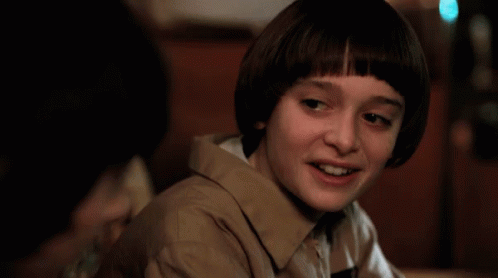
Here, Will and Mike seem to establish this mutual understanding. They have both gone through a change to themselves and their understanding of the world around them that has forever altered their perceptions, and while Mike references El here, his conversation with Will is not about El, it's about revealing himself and his own fears and insecurities, so just like in the rooftop scene from High School Musical, we get this mutual acknowledgment of each counterpart seeing the other for who they really are, and not who they are expected to be or who they were before their perspectives changed (for Troy and Gabriella, they believed they had to remain as the basketball guy and the freaky math girl, but when they sang together, it changed their perceptions of who they had to be).
The "crazy together" line here functions in tandem with the "like kindergarten" callback we see between Troy and Gabriella in High School Musical. When Troy uses this line on Gabriella towards the end of the movie, it's as a reminder to her while they are on stage together performing that she doesn't have to be self-conscious, and he invites her back into that vulnerable space of being in "kindergarten" where you could just be yourself. Similarly, "crazy together" is used as a way for Mike and Will to both know they're not alone and that they equally see each other for who they are.
Sharpay/Troy and El/Mike Conflicts
Okay, so I'm now going to jump into the second movie in the HSM franchise, because I think this is where we see the strongest narrative parallels to ST4.
The setup we get to HSM 2 is that summer is coming and the main cast of characters is looking for summer jobs. Sharpay decides that this is the perfect opportunity to shoot her shot with Troy, and we see her kind of attempt to interject herself into his relationship with Gabriella by getting Troy a job at the country club her parents run, which soon backfires because Troy convinces the hiring manager to hire practically all of East High, including the basketball team and Gabriella.
However, Sharpay, being herself, doesn't give up on Troy that easily, and schemes several times to attempt to get him alone and to get in the way of his spending time with Gabriella. While I think Sharpay's whole arc in this movie is compelling for the purposes of Byler, there are a few scenes in particular I want to take a look at.
The first is the dinner scene that takes place with Sharpay and Troy. While Troy is caddying for Sharpay and her family, Sharpay lets him know that she was able to pull a few strings to set him up at dinner with a college scout who would be looking to give out basketball scholarships and basically forces his hand into attending a dinner with her, her parents, and the college scout, all while she treats Troy like her boyfriend, and we can see he's incredibly visibly uncomfortable throughout the entire dinner.
After Sharpay talks up Troy's other talents, we see her start bragging about his singing as well and even tries to get him to sing at dinner in front of her family. After he refuses under the guise of his voice being hoarse, Sharpay says, "But you will sing some other time, with me, promise?"
Here, Sharpay is attempting to get Troy to invest in her and spend more time with her. Troy knows what she's getting at and wants to shut this down, but he feels unable to do so because her parents are right there, so he reluctantly agrees to sing with her.
And we get the poor boy looking the most uncomfortable he's looked in his entire life right here:
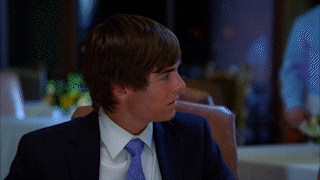
You can see the look of instant regret on his face after he agrees.
Of course, Sharpay doesn't give up there; she orchestrates an entire romantic music number to try to set herself and Troy up as counterparts and throws the music at him to try to get him to sing along. This is where we finally see Troy standing up for himself and asserting that he's already dating Gabriella and that nothing between he and Sharpay is going to happen.
From these moments, we can clearly see that Sharpay is trying to get Troy to see romantic potential in her and admit feelings for her, even when it's made clear to the audience that he doesn't.
So why is this relevant to Mike and El? Well, if you've stuck with me this far, this narrative should be sounding a little familiar.
Aside from the fact that the main conflicts in both of these arcs begin at an awkward dinner, we see a lot of the same dynamic playing out with Mike and El when El confronts Mike about not saying he loves her.
After El brings up the way that Mike looked at her at the roller rink, Mike says that he doesn't view her as a monster and that he was just surprised and confused, but it doesn't matter because he "care[s]" for El "so much."
El looks hurt by this and says, "Care. But you don't, you don't love me anymore?"
We can see that she's looking for reassurance in this scene. She needs to know that Mike still loves her without her powers and that she can depend on him, but all we really see back from Mike is defensiveness.
He follows up by saying, "Who said that I didn't?"
And we get the infamous:
"You never say it"
"I say it."
exchange.
When El tells him he can't even write it and brings out the letters as proof, he blame shifts and says that El shouldn't let the "Mouthbreathers" ruin their relationship.

I love seeing these gifs of Mike and Troy juxtaposed because they both look equally as uncomfortable in these shots, and you would think that a guy in an established relationship with his girlfriend would not be pulling the same facial expressions when his girlfriend is trying to affirm for herself that he loves her as a guy who is getting hit on unsolicited from a girl outside of his relationship.
While these plot lines are slightly different, El and Sharpay are playing very similar roles in both: trying to get the guy they like to reciprocate their feelings.
In drawing this parallel, it forces the viewer to see El and Mike's relationship in a different light, because El is being paralleled to Sharpay who is getting in between the relationship between Troy and Gabriella. Now, I don't support the rhetoric of El getting in between Byler outside of this post, but for narrative purposes of these parallels, this is how it's being presented.
Which, in the context of the overarching story, makes seeing this TikTok in which Byler directly visually parallels Troy and Gabriella (though now it appears Will takes the place of Troy and Mike takes the place of Gabriella) all that much funnier.
(the shots here are slightly edited, so it isn't exactly in sync, but it's pretty damn close).
And if you're thinking it might be a stretch to compare these two scenarios, this is what really did it for me:
Towards the end of the movie, Troy reconciles with the basketball team after not acting like himself and putting himself before his friendships with them, and we see Sharpay looking worried at the fact that both her brother and Troy bailed on singing with her when she brought talent scouts out to come watch her perform.
While Troy is perfectly ready to just let her perform without him, we see Ryan come up to Troy and basically convince him to get back out onstage and sing with Sharpay. Ryan tells him, "Troy listen, all these people out there, I don't really wanna see my sister crash and burn. At least I think I don't. I think you should sing with her."
Troy looks pensive, and then he breathes in like he's about to go to battle before going to Sharpay's dressing room to agree to sing with her.
Now, while this ends up just being a ruse to get he and Gabriella to sing together, the narrative device of having Ryan have to push Troy into singing with Sharpay could not be any more similar to Will's "Don't stop, okay? You're the heart."

Both Troy and Mike have to be pushed into this act with Sharpay and El respectively, as neither one of them was going to volunteer of their own accord.
Try Before You Deny
I can't believe I'm saying this, but after having watched High School Musical 2, I now believe that the fruit on pizza metaphor was, in fact, intentional queer-coding, and here's why:
The subtext in the Surfer Boy Pizza scene is the same as the subtext in the scene that occurs between Chad and Ryan in I Don't Dance.
Let's take a look:
So we have Ryan coming up to Chad after Gabriella invites Ryan to the staff baseball game. They get into a little bit of a standoff when Gabriella suggests that Ryan can save the talent show after Troy bailed on them because Ryan knows how to direct and choreograph. Chad then says to him, "If you want to play ball, then grab a mitt. But I don't dance."
Ryan comes back at him by saying, "You don't think dancing takes some game?"
And Chad asks, "You got game?"
To which Ryan responds, "A little."
Someone then passes Chad and Ryan the bat, and they put their hands one over the other until Ryan has claim over the top of the bat, signifying that he will be pitching first.
This whole song is heavily queer-coded and associates itself with playing for the other team, which way Chad "swings," and experimenting at things that aren't in your wheelhouse, but I want to talk about a few of the lyrics throughout the song as they seem particularly relevant to what's going on in the Surfer Boy Pizza scene.
The pre-chorus of this song literally goes:
"You'll never know"
"Oh, I know."
"If you never try."
"There's just one little thing that stops me every time...
Yeah, Come on! I don't dance!"
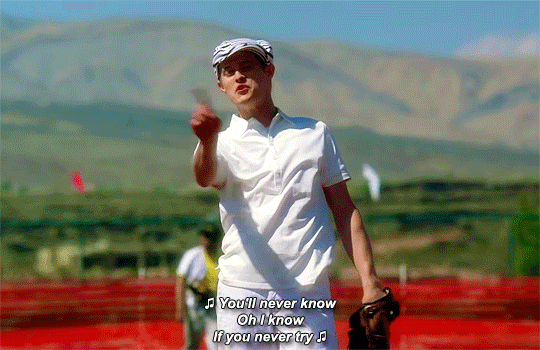
The subtext in these lines is pretty self-explanatory, but this is basically Chad saying that his pre-conceived notions about himself stop him from trying to dance. He's incredibly resistant to trying anything that would shake up his jock persona.
When we look at this in comparison to the Surfer Boy Pizza scene, a lot of this dialogue shows up the same.
In this scene, we see Mike and El about to have this meaningful discussion about the last argument they had before El left, but they get interrupted by Argyle dropping a pineapple pizza in front of them.
Mike then says, "Dude, this is pineapple on pizza"
And Argyle says, "Try before you deny."
El then tries the pizza and says, "Good."
And Mike, in disbelief asks, "It's good? What do you mean it's good?"
And El just says, "Really good."
Mike then replies, "What? That's insane! That's blasphemous! Putting fruit on pizza?"
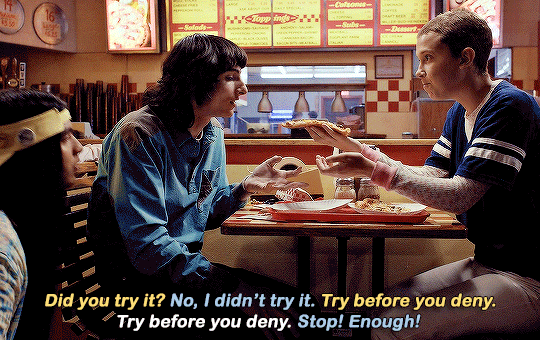
We then see Argyle and El start trying to force-feed Mike the pizza, to which he is completely resistant, until he finally tries it and says, "No, you're right, it's good."
Just like Chad, we see Mike being encouraged into an action that's out of his comfort zone, and just like Chad, Mike is adamant about not trying it and resistant to this change.
While Mike finally lets down his resolve against the pineapple pizza and finally accepts that it's good, we see a similar acceptance between Chad and Ryan when they both partake in each other's game (Chad dancing and Ryan playing baseball), and then we see them hanging out together in the next scene having switched into each other's clothes, fully embracing both parts of themselves.
You could chalk this up to coincidence, but between the narrative similarity in how these scenes play out and the use of the word "try," but specifically it's use in the same context, "you'll never know if you never try," and "try before you deny," I think there's a good chance that they incorporated some of the queer subtext from High School Musical within this scene.
This is pretty much the bulk of what I got when looking at these two in conjunction with one another, but let me know if there's a moment I missed! Hope you enjoyed this one!
#byler#byler endgame#byler nation#mike wheeler#will byers#will x mike#mike x will#st#stranger things#el hopper#argyle#troy bolton#gabriella montez#sharpay evans#ryan evans#high school musical#hsm#stranger things parallels#stranger things analysis#try before you deny#will byers is gay#mike wheeler i know what you are
139 notes
·
View notes
Text
SEPARATE WAYS SONG - ANALYSIS
I just can't believe how well chosen this song was for season 4. And it really fits with Byler's arc this season (also with Lumax and Jopper's arcs)

This first strophe fits with the situation in which the characters are in at the end of s4
Hearts broken, sleepless nights. Pay special attention to who are their reaching for, now that they're losing ground. (The UD is consuming the -normal- dimension)
Lucas reaches for Max and, Mike reaches for Will, now knowing that he's still connected to 001.

Feeling that it's gone could change your mind.
At first, they all thought that 001 was finally dead, except for Will (and probably El). Mike was the first person that had been told about this, and he's willing to kill 001 more than ever.
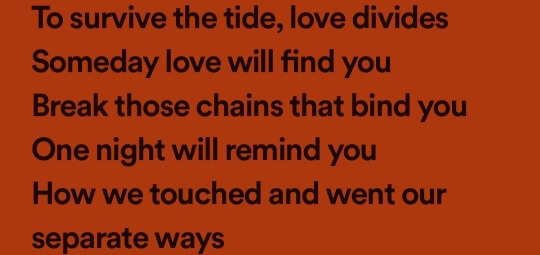
The chorus in this remix is just a piece of art.
Someday love will find you, break those chains that bind you.
Oh, that hits hard. By one side, we have Hopper, who is literally chained in another continent. Max is bounded by her traumas and Mike/Will are bounded by their own fears and homophobia.
One night will remind you how we touched and went our separate ways.
In season 3, when everything seemed to be already figured out between Mike and Will, it was too late, because now they were going to be separated.
- same situation with Jopper, when they finally arranged a date, hopper "died".

Time passed and nothing got better. They were in troubled times.
Mike and Will's reunion was, at first, not positive at all, they were jealous, hurt and confused.
They even seemed to be distant when all they really wanted was to be closer to each other.
- Max was also distant, her eyes were literally distant.
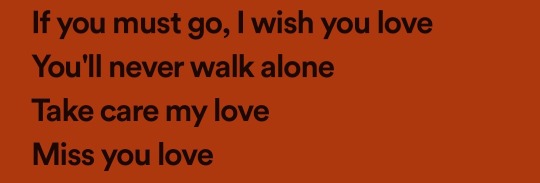
You'll never walk alone, that phrase is enough to understand the context of the whole strophe and the ending of season 4. They're united.
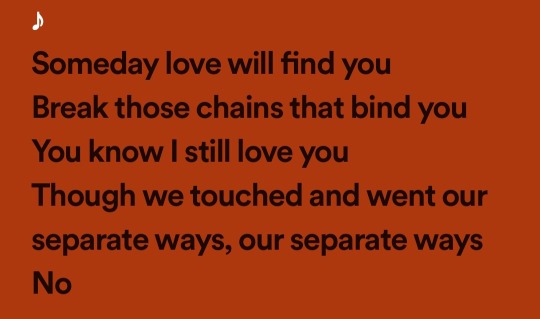
Then, we have the chorus again, but this time, -you know I still love you.- Many things happened between them and between the chaos, but they never stopped loving each other. Even when they've been separated for a long time.
I'd like to add that the only part of Journey's original song that was not included in this remix are these two verses, because I find it pretty interesting.
If he ever hurts you, in the original song, it talks about the man that the person who the song is dedicated to is dating. But, in the series, he has a deeper meaning.
True love wont desert you. Curious... because a certain true love act didn't work.


Music selection IS important and IS meaningful. It's not just a nice sounding song.

47 notes
·
View notes
Text
The reason i like to analyse character's music taste isn't because i care what it is that they listen to, but more how their music reflects their personality and experiences.
It's the eighties, which means that the only ways to be introduced to music are through the radio, by the people around you recommending stuff or by actively going to a library/music store to look for new things.
The radio
The party doesn't seem to care about music at all. Dustin has nothing of note hanging in his bedroom suggesting there's any band or whatever that he likes, and in season one they refer to Should I Stay Or Should I Go as 'that weird song'. This suggests that Dustin and Lucas and Mike even probably just listen to the radio or whatever music their parents play.
When Mike is with El in s3, they're just listening to the radio, and that's the music Mike's familiar with as he starts singing along. it's the only time in the whole show Mike shows any interest in music at all.
2. influence of the people around you
Will's influenced by Jonathan. He himself is not the kid that goes into music stores because he's a kid and prefers to spend his time with his friends. But Jonathan, on the other hand, doesn't have friends and probably does go to the music store to find new music similar to the ones he likes. More importantly, he has the time and interest to curate the songs he copies off the radio.
Will cares about Jonathan's opinion at first because it's a thing they have in common and because he doesn't really know what else to listen to anyway. And that influence clearly sticks with him because he has a positive association with these bands and this style.
Mike on the other hand, clearly doesn't care about his parents' opinions and would automatically reject their music, and he's also not going to listen to what Nancy listens to because they have that typical sibling relationship where everything your sibling does is automatically bad.
If there's one person that would influence Mike, it's Eddie in season 4. But still, we don't see him being into Metal music, and i think that's just not his style at all. I think Mike would nod and pretend to like it because he wants Eddie to like him, but it's not something he would genuinely enjoy.
3. Going out to explore music on your own
In season 4 in California, Will clearly went out to explore music of his own because we can see that he likes new bands like The Cure, and that he has a record player now.
Jonathan was distant, and he didn't have any friends anymore, so he was either influenced by his classmates/new environment and/or went out to music stores or libraries or whatever to find new music on his own. He also has a lot more time now, like Jonathan, to just sit in front of the radio and record songs he likes from Californian radio stations, meaning he's exposed to a whole new variety of music, and actually gets to chose the songs he likes of his own accord.
Still, the fact that he got a record player and the new poster suggests he at least had to go out to a record store, because you can't copy those off the radio.
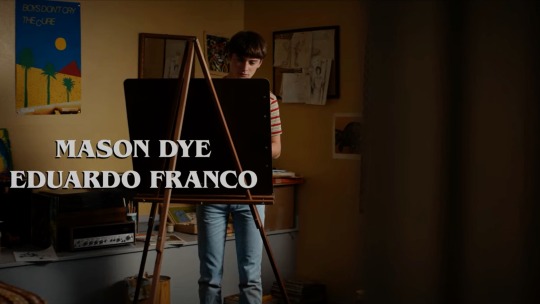
It represents him growing older and into his own person, and also how being in a new environment is influencing him/shaping him, and yet how he tries to stick to something that binds him with Jonathan. But also music is in turn influenced by his inner feelings. How he looks for music to represent him and as a genuine hobby/distraction rather than just something to passively turn on for background noise.
We see the same with Max, where she suddenly has her walkman and a variety of tapes with her at all times. Music is a way to cope for her, and as the alternative is being in the trailer park alone, I'd see her go out to music stores to search for new songs plenty. It represents her looking for an escape and a distraction, where music is no longer just something to dance to but also something to grief with and to just get lost in. But her music choice (Kate Bush) in turn also reflects how she's feeling, because her feelings influence her taste.
31 notes
·
View notes
Text
So uh. Not to go full parentified!Mike again, but: I just realized that the track that plays when Mike and El fight in The Monster & The Superhero (aka a kind of orchestral version of Eulogy) is also the same as the track that plays when Max goes behind her house, sees her mother and it turns into a Vecna vision in Dear Billy? Like:
It’s subtle, but if you listen to the full scenes it’s more apparent—and we all know that repeated use of track means, at the very least, exploring similar themes.
Given that this is the same track/leitmotif used in two other "familial" moments, aka when El watches Mama fade in the void and when Hopper tells El "its not about our fight/eat real food, not just eggos (x) " over the radio in the police van halfway through S02E06…it’s, once again, looking really damn bad for any ongoing romantic interpretation of Mike’s “care” for Eleven. 😭
Like? The scoring choice paralleling all of these scenes featuring familial bonds...somewhow sans mlvn? On top "Eulogy" being inherently connected to death/the loss of emotional connection in all cases, with special emphasis on letters in the S4 parallel scenes—
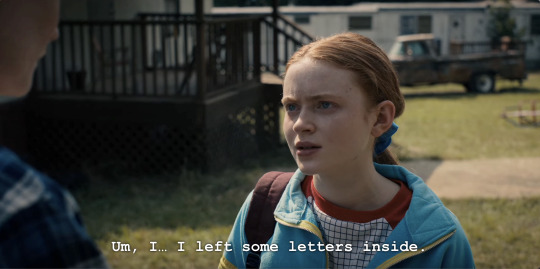
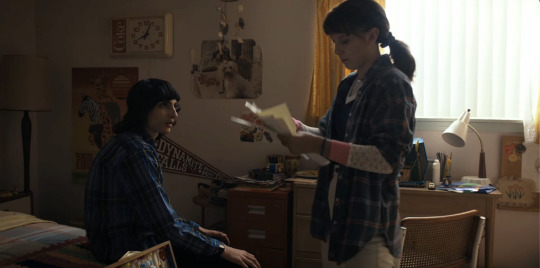


—all before we get to the Vecna or matching blue plaids aspect of it? It’s giving…platonic-familial (and also really tragic misunderstanding) mlvn. Just like everything else.
like. I said Max and El were paralleled in their depression re: Dear Billy before too, but this adds a whole new layer of Mike being paralleled to parental-authority figures, & in an especially tragic way.
part ii
#I went into dear billy looking for a clip for a gif and game out with this knowledge pls I’m crying#anti mlvn#byler#el hopper#mike wheeler#max mayfield#my st commentary#parentified mike#st parallels#stranger things#st music analysis
145 notes
·
View notes
Text

Music in ST Posts
ST and Shrek and Soundtrack Choices (x)
ST and Music That Seems Nonconformist But Is Actually Conformist (x)
“Play With Me” vs “Rock Me Amadeus” (x)
Initial Post About Paying Attention To When Music Isn’t Playing During The Creel Murders (x)
Music Being Described As A Cure For Pennhurst Patients (x)
She’s Got You In S3 Is About Byler (x)
The Use of Organ Music With Vecna vs The Organ In The Creel Attic and The Sheet Music Stand in The Creel House (x)
California Dreaming vs Dream A Little Dream of Me vs We’ll Meet Again (x)
Raise A Little Hell vs Vecna Literally Raising Hell (x)
We’ll Meet Again, Dr. Strangelove, Yanks, and The Singing Detective (x)
Kingsmen and Zoolander and Music and Massacres (initial post/reblog of James’ post) (x)
Brief Initial Post About ST vs The Wall (x)
Iron Maiden Album Cover Vs Henry/Edward’s Straightjacket Comment (x)
Weird Al in 3D (x)
A(L) SILLY, TERRIBLE PLAY: Weird Al, Scott and The First Shadow (x)
I Hope They Throw Away The Key: Parallel Between TFS and The Wall (x)
#stranger thjngs#st music analysis#st music#st ost#pinned post section#pinned post section: st music
15 notes
·
View notes
Text
Part three to the Sleep Token FX post. Some of these I've picked up on my own, and others have been pointed out to me by @reveries-of-my-mind and @moonchild-in-blue through their reblogs of my original post about Vore. A lot of these FX bits are more obvious, so I decided to just put TMBTE in one post.
Part three includes: Take Me Back To Eden
Part One -> One, Two, Jaws and The Way That You Were
Part Two -> Sundowning and This Place Will Become Your Tomb
+ If I've missed something, feel to add your own thoughts!
Note- some of these are FX, others are sound mixing and music bits I wanted to mention. Any song you don't see mentioned are songs that I couldn't find anything to pull out of them. Plus, reminder; these are my interpretations, I'm sorry if you can't hear what I hear, or you think something different.

Chokehold
- Lots and lots of digital, glitchy FX which sets the mood for the album. This is also repeated throughout all the songs in the album, which works with their algorithm-esc, robotic theme (both lyrically and musically) in their songs for this one.
The Summoning
- Unfortunately, everyone's favourite jazz-metal amalgamation doesn't have any other SFX notes other than carrying on Chokehold's glitchy FX motifs.
Aqua Regia
- Jazz café ambience shown throughout the song, also, every single instrument other than the main paino is echoed and or muffled.
+ Fun fact! Aqua Regia is Latin for Royal Water. It's a concentrated solution of Hydrochloric and nitric acids, and is one of the only acids that can dissolve Gold; it's used in the jewelry trade to test the purity of Gold. Not a clue what Vessel is trying to get across with that, but his obsession with chemistry and biology motifs strike again.
Granite
- The screetch of the guitar chord at 2:32, right before the breakdown, sounds almost like a car hitting the breaks and skidding. Works well with Granite's theme of car crashes. You can almost imagine someone having an argument in the car, and the screetch is a result of things going a bit too far.
Vore
- Like I said in my original post, in the beginning (first fifteen seconds), along with the scratchy guitar chord, there are chewing and swallowing sounds. The song is quite literally from the point of view of being stuck in the throat of a God.
- At 3:23 to 3:30, there are bird noises similar to the ones at the start of TMBTE! They're incredibly subtle, but they're there. If you can't pinpoint it, there's a squeaking noise at 3:27, which is just a bird tweeting!
Rain
- From 3:55 to the end of the song, there's rain, which is obviously very fitting. Not specifically rain tapping on a rooftop, but more so rain pouring down a gutter, at least to me.
Take Me Back To Eden
- From 0:00 to 0:40, there's echoed animal noises, like if you were to stand in the middle of a rainforest. The song starts of in absolute silence, only broken by nature; not a human made noise to be heard. It's quite literally Eden. These sounds are there throughout the song, they just get much harder to hear the longer Vessel sings and the more instruments they later on top of eachother.
- At 1:42, there's either a Lion's or a Tiger's roar.
- From 3:10-3:16, there's the sound of thunder.
- A lot of the jingles you hear in The Summoning are repeated here! E.g; 3:40 and, more clearly, at 4:50 and 7:50.
- The lyrics "we were tangled up like branches in a flood; it was no accident" are direct refrences to the lyrics in Chokehold.
Euclid
- The song is 5 minutes and 13 seconds long, but Vessel only starts singing at the 13 second mark. The first lyric? "Just run it back, give me five whole minutes". We, as the listener give him five whole minutes to say what he's gotta say. Further, the song ends on the exact same piano chord that it begins with; the song, in of itself, is a loop. Anytime you play Euclid on loop, you are running it back and giving him five whole minutes. One of the reasons Euclid is my favourite (next to Aqua Regia) for this album.
- The lyrics "the night belongs to you" and "this bough is broken through" are lyrical refrences to The Nigh Does not Belong to God from Sundowning and When The Bough Breaks from One. The oldest album, and ST's first produced album.
- From 4:02 to the end of the song, a verse from The Night Does Not Belong To God is played. It completes the produced album trilogy, and, with the five stages of grief, allows for acceptance and healing. Euclid not only loops itself, but loops the three albums together. Sundowning, TPWBYT and TMBTE are an endless loop that can and will be played as many times as needed for Vessel, for you, as the listener, to heal. To accept change. To realise there's more than denial, anger bargaining and depression. And I think that, in of itself, is beautiful.
---------
Album Notes: Sleep Token really put their whole soul into this album huh. By far, it's the one that uses SFX the most, and rounds out Sleep Token's own genre as a whole. We see snippets of older songs used throughout the album, both lyrical refrences and actual chunks of old songs taken out and placed within other ones. 10/10, would cry to again.
Thank you for reading through all my thoughts and feelings, whoever you are. Remember, the night belongs to you; worship <3.
#THIS ONE.#TMBTE my one true love#they do a lot of linking older songs in this album#and I love it#a lot#the brainrot grows stronger each and everyday#someone said something about needing to study them under a microscope and I completely agree with that statement#the fact that Euclid loops their three main albums together kills me#like I'm dead on the floor#I'm never getting over that#I'm gonna crumble to bits when I see them live I swear#music analysis#music and lyrics#sleep token#sleep token vessel#vessel#st#sleep token tmbte#mel's rambles
34 notes
·
View notes
Text
The Heroes Theory
The key to understanding Stranger Things lies within a single song.
Buckle up, folks — this is very long. But I hope you enjoy your read! :)
This is my argument that the entire concept of Stranger Things, from the messages to the themes to the characters and relationships, can be summarized within one core motif that weaves through every season. Here I’ll be looking into the subtext and metaphors at play in Stranger Things as a whole, using Heroes to help show why requited Byler is the most sensible outcome from a writing perspective.
When I refer to the “Heroes Theory,” I want to be clear that this theory includes more than just the song for which my theory is named. Of course, Heroes itself is the foundation of the theory, but it extends far beyond that. This includes character arcs, dialogues, plots, and themes.
Let’s start with a bit of background on Heroes itself, its context, and what it can tell us about Stranger Things.
[CW: I briefly discuss the depiction of MH issues on the show, as well as various forms of oppression like homophobia, classism, and racism]
Background to Heroes
Heroes is an original song written by David Bowie, released in 1977. At the time, Bowie was living in Berlin after a long run of tours while battling addiction. It was a time of creative exploration and innovation for him. Keep in mind, this is all taking place in the midst of the Cold War, which is also the historical backdrop to Stranger Things.
Bowie has explained that he was first inspired to write Heroes after seeing a couple kissing next to the Berlin Wall. The couple were having an affair, and combined with the context of their affair happening next to the Berlin Wall, the scene he saw was one of forbidden love. So Bowie wrote the song describing a moment of defiance when the couple decided to forget about society’s judgement and shame, choosing to live as heroes in a moment of passion.
For the sake of our discussion, the following lines form Heroes are the most important. This is around the bridge of the song, at the point when the forbidden couple finally overcome their feelings of shame and their fear, choosing to embrace their passionate feelings instead:
I, I can remember (I remember)
Standing, by the wall (by the wall)
And the guns, shot above our heads (over our heads)
And we kissed, as though nothing could fall (nothing could fall)
And the shame, was on the other side
Oh we can beat them, for ever and ever
Then we could be Heroes, just for one day
And not only is Heroes a song about forbidden love in the face of violent repercussions, Bowie himself was a revolutionary figure for queer folks in the 70s and beyond. From his identity as a bisexual man, his androgynous clothing style, and full of acceptance of queer people when we were ostracized by most.
For these reasons, his role in Stranger Things is an important one given the themes of conformity and being an outsider that the show highlights (along with its queer characters). Now, put on some Bowie, and let’s discuss!
Heroes in Stranger Things
At this point you might be like: “okay cool, but what on earth does this have to do with Byler and Stranger Things?” I hear you! Let’s look at how Heroes is used in the show.
Heroes plays twice in Stranger Things. However, what plays is a more somber cover by Peter Gabriel. Both times it’s used during emotional scenes.
In my view, the song has come to represent two important themes: 1. resurrection and 2. conformity vs. acceptance/love.
Season One: Will’s Body
The first time Heroes plays is during S1, when Will’s “body” is discovered in the quarry. It plays as Mike goes home, and while Jonathan and Joyce hug in a shot which mirrors Mike and Karen back at the Wheelers house.
This scene expresses two things. 1. For Mike, he is told his best friend is dead. He watches as his body leaves the water. He’s heartbroken. 2. For Joyce, who doesn’t yet know about Will’s “body,” she has spent the day communicating to Will in the lights. She’s terrified, but hopeful.
As viewers, we see both sides. We see Will’s “death,” but we also saw Joyce communicating with who we suspect is Will. In this way, Heroes plays over a scene symbolizing both death and resurrection. By resurrection, I mean the fact that Will was believed to be dead, but he turns up alive.
While the cover of Heroes plays during this pivotal moment of hope and heartbreak, it’s quite telling what we’re shown on screen when certain lines are played:
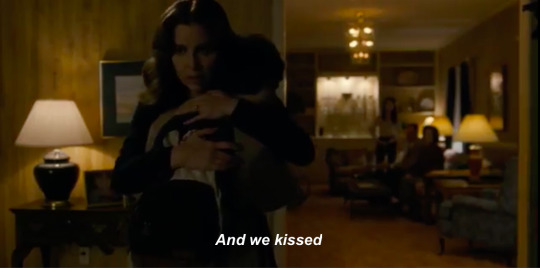
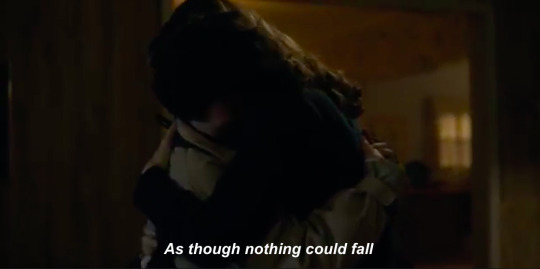

What I consider to be the most romantic and thematically queer lyrics in the entire song play during the point when Mike runs into Karen’s arms after learning Will is “dead.”
And we kissed, as though nothing could fall (nothing could fall)
And the shame, was on the other side
Here, the symbolism of “other side” is important given the context of the show. For Bowie, “other side” meant the East Berlin at the other side of the wall. The wall itself had violent repercussions (represented in this line by “the shame”) for attempting to cross it. In the context of Mike, “the shame” could represent his internalized homophobia and the confusing feelings of losing a best friend who he doesn’t realize he has romantic feelings for.
In Stranger Things, the “other side” could obviously represent the Upside Down. Especially given that we know Will is in the Upside Down at this point in the show, facing violence. But in this scene, it could also represent death as the other side of life. I think it’s interesting that the Upside Down consistently has imagery of death and decay, given that it’s the very opposite of the warmth we often associate with Hawkins.
Although Heroes itself isn’t a song explicitly about queer love, it is thematically queer. By this, I mean that the subject matter of the song is lauded in queer subtext and imagery.
This is all taking place during the 1980s. A time that was profoundly homophobic and opposed to anyone remotely different to the societal standards. We’re also located in a small town in Indiana and have canonically homophobic characters. The theme of shame over being who you are vs. learning to accept yourself anyways is crucial throughout the entire show.
I don’t think Will or Mike were aware of their romantic feelings for each other during S1, rather, the use of Heroes during S1 serves as foreshadowing for the future of their relationship, and sets up the theme of resurrection.
Could the placement of the Heroes lyrics be a coincidence? Sure, anything could be. Even so, the writing and production team chose to use a romantic song about forbidden love (written by a bisexual rockstar and queer icon) for this scene. In a series where every song serves an explicit lyrical purpose, these things aren’t accidental.
Especially when the song is used more than once.
Season Three: Hopper’s “Death”
The second time the Heroes cover is played is during S3. It’s the final scene of the season. The song begins to play as El finishes reading Hop’s letter. Then it continues as Joyce takes one last look around the Byers’ house before leaving for California.
This time, the lines “and we kissed, as though nothing could fall (nothing could fall). And the shame, was on the other side,” are not included. None of the lyrics line up with Mike or Will. This time, the song is hinting at the theme I spoke of above: resurrection.
All of our characters and the audience are supposed to believe Hopper is dead at this point in the story. Of course, we now know the truth. Just as Will was believed to be dead the last time Heroes played, the song once again signals this isn’t the case. Hopper isn’t really dead. There’s hope. New life and love will blossom again in S4.
Moving Beyond Season Three
Originally, I theorized [here, here] that Will would fall under Vecna’s curse in S4 vol. 2, and Heroes would be the song to save him. Only this time, it would be Bowie’s original version of the song. I was obviously wrong . . . but I wouldn’t be surprised if Heroes pops up again in S5 with the context of Will (and especially his relationship with Mike). Rising above self-hatred. Living life to the fullest, refusing to let fear stand in the way of pursuing the love you feel inside.
“Being a freak is the best, alright?”
The times Heroes plays in Stranger Things aren’t the only times Bowie is referenced. I do think if the song plays for a Byler scene, it’ll be the original version that plays. I go into this in more detail in another post [here], but for a bit more context, let’s take a look at one of my favourite moments: Jonathan and Will’s conversation about shame and being a “freak.”

Jonathan: You know what? You’re right. You are a freak. But what, do you want to be normal? Do you wanna be just like everyone else? Being a freak is the best, alright? I’m a freak . . . Who would you rather be friends with: Bowie or Kenny Rogers?
Will: Ugh.
Jonathan: Exactly. It’s no contest. The thing is, nobody normal ever accomplished anything meaningful in this world.
One of the core themes of Stranger Things is accepting what makes us different. Our differences are our strengths, and the writers of Stranger Things want their characters (and us) to understand that. Jonathan’s line: “nobody normal ever accomplished anything meaningful in this world” is particularly important.
Our characters aren’t the typical heroes of 1980s films and movies. They aren’t popular. They have nerdy interests and aren’t ashamed of it. For the most part, our core characters own the things that others judge about them. And when they don’t, part of their character arc is about learning to accept their true selves.
Jonathan uses Bowie as an example for the outsider figure that represents not only Will and himself, but every other character we’ve come to love. Even Steve, reformed stereotypical 80s jock, is no longer bound to the pressures of the larger society.
But in the context of Will, his comparison to Bowie is another way of queer coding a character who we know is canonically gay and in love with his best friend Mike. Bowie is a “freak” because he’s unique and an outsider, but also because he’s queer — and in 1980s small town Indiana, at the height of the AIDS crisis, being gay was just about as “freaky” as you could get.
To demonstrate this core idea of embracing your inner freak and finding a found family who loves you despite your “outsider” status, the entirety of our main cast have experiences which turn them into outsiders in the eyes of larger Hawkins.
To list a few: Joyce is divorced, working class, and a single mother who has “conspiracies” that many shame her for, Jonathan is bullied for being working class, Will is gay and bullied by homophobes; Lucas is Black and targeted by racists (Troy, Billy, Jason); Max has stereotypically “boyish” interests, is from an abusive working class home, and has mental health issues; El has superpowers, lacks assumed social cues, and is neurodivergent coded; Dustin has a rare genetic condition which he is bullied for; Robin is a lesbian and worries about becoming a “social pariah”; and Mike . . . is a gamer?
Alright, I know Mike is also bullied for being a nerd and is called “frog face,” but other than his status as a geeky kid, is Mike really any different than what Hawkins expects of a boy his age? He’s upper middle-class, has great friends, is smart, and even has a girlfriend. So why is it that the least-outsider of our outsiders is seen as our leader, and the eyes of the audience?
Mike Wheeler is the Audience’s Eyes
Given that, in my view, Byler is the only sensible outcome for Stranger Things because of its themes, character arcs, queer references, costuming, staging choices, etc. etc., I don’t believe the Mike we see is the real Mike Wheeler. We only see the real Mike in brief glimpses. Here’s why.
Mike is the central POV character for seasons 1 and 2 of Stranger Things.
In another breakdown [here] I analyzed Mike as the central POV character in S1 and S2. But let’s stick with this idea that Mike is the main member of the party who we learn alongside during S1. For example, during the Will’s “body” scene discussed above, it’s Mike’s reactions that the camera pans to. We see Mike crying and reacting to his best friend dying, we follow him home, and learn about Will’s “death” with him.
In S2, we have other establishing shots where the camera lingers on Mike longer than the other party members. When Will is taken to Dr. Owens, for example, the camera focuses on Mike and we hear his thoughts. Mike finds Will having an episode in the field, which is also when we discover his episode. Mike spends the entirety of S2 with Will, including the climax of Will’s exorcism where Mike plays a pivotal role.
Why Mike? For the original audience demographic, which was probably expected to be nerdy teenage boys/adults, our “eyes” in the show are placed onto a character who a wide variety of people can relate to. He’s the loyal ‘til death, heroic friend, nerdy boy, bullied, but not for any perceivable differences. And this is mid-2010s media we’re talking about, so of course the protagonist character is going to be a white boy.
What the hell happened in seasons 3 and 4?
Mike seems to vanish as our primary POV character after S2. Multiple POVs come into focus, and El becomes our main character over Mike. I think Will’s writing in S3 and S4 is a bit of a mess at times, but aside from S2, his screen time was never as much as Mike’s. The reduction of Mike’s importance, and the strange turn his character takes in S3 is telling. I think the Duffer brothers deliberately reduced Mike’s role as our “eyes” in the show during S3 because this is when his queer awakening begins to take place, and we aren’t supposed to know yet.
Mike Wheeler, I Know What You Are
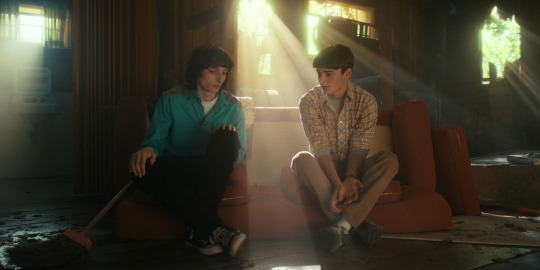
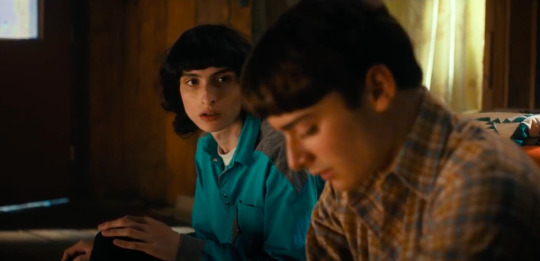
And you sure as hell ain’t straight!
This isn’t an Em-tries-to-convince-you-unbelievers-Mike-is-queer theory. I’ll leave that up to the pros! Instead, I want to tell you why Byler endgame makes the most sense thematically within the context of a story that is at its heart about freaks and outsiders and found family and refusing to conform.
Mike Wheeler has Internalized Homophobia
“What’s internalized homophobia?” it’s a real nasty piece of work, that’s for sure.
Basically, it’s the idea that as queer people grow up in a heteronormative society which perpetuates shame and hatred towards queer people, we will internalize that shame and hatred, pitting it against our own sexuality. It’s a very common experience for queer people, especially in less-accepting generations, and Mike’s strange behaviour from S3 onwards could easily be explained by his own feelings of internalized homophobia, including his relationship with El.
Mike and Will have the potential to be the classic childhood friends to lovers storyline, only this time it’s between two boys instead of a boy and girl. We all know how much the Duffers love to subvert expectations.
Only their storyline is more complicated by the internalized shame each boy harbours towards himself. We’ve canonically been shown Will’s internalized homophobia, starting from S2 when he worries about being seen as a “freak.” Growing up and having his father call him homophobic slurs, being bullied for being gay, and living in the midst of the AIDS crisis when gay men were scapegoated and treated abhorrently by a moral majority — all are prime reasons for the shame he feels towards himself. S4 only emphasizes this with Will feeling like he’s a “mistake” for being different.
But Stranger Things doesn’t want its viewers or characters to feel this shame. They want us to find a family who loves and accepts us. They want us to accept our differences and love the things that make us “outsiders.”
That’s the whole point of the show. That’s why the homophobes, racists, and bullies are consistently fought against: because what they say isn’t right or true, even though it was popular opinion at the time.
In the case of Mike, the way he pulls away from Will in S3 and S4 could be explained with the shame he feels for his own queerness. A lot of people think Mike has turned into an asshole. A shitty friend. He’s so drastically different from how he was in S2, and there’s no real reason for this change. Unless the reason is an internal one that we haven’t been shown yet.
The Rain Scene
The rain scene has been analyzed a thousand times. From the parallel to the Milk Ban fight where Milk Ban is played for laughs and Byler is meant to be devastating, to colour analysis, film references, and more. This scene haunts me. Seriously, they did that.
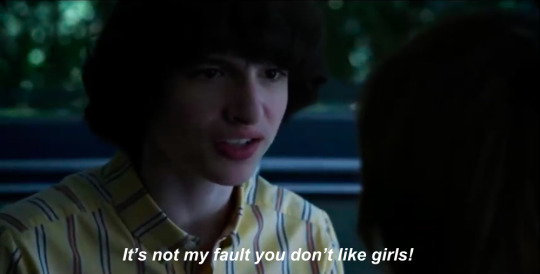
Mike obviously isn’t homophobic. We’ve seen him defend Will from homophobic bullying in S1. But he does have a hell of a lot of internalized homophobia, and oh boy is he ever projecting during the infamous fight scene.
His attack on Will (which is really projection of his own feelings onto the boy he fancies) is twofold: 1. internalized homophobia combined with 2. Mike’s idea that growing up means conforming to heteronormativity.
But this scene isn’t from Mike’s POV. It’s from Will’s. We’re meant to see Mike as an asshole. We’re meant to empathize with Will as he destroys Castle Byers: a symbol of his childhood and heteronormativity [more here].
Mike: “I’m not trying to be a jerk, okay? But we’re not kids anymore. I mean what did you think, really, that we were never gonna get girlfriends? That we were just gonna sit in my basement all day and play games for the rest of our lives?”
Will: “Yeah, I guess I did. I really did.”
This isn’t just Mike being mad at Will for “refusing to grow up” or whatever. He’s specifically calling out Will’s critique of Mike having a girlfriend. At this point Will is fully aware he’s gay and has feelings for Mike. Mike is very much in denial. For Mike, growing up means getting a girlfriend and following the lifestyle his parents outlined for him. He denies any other feelings he may have and instead takes out his self-hatred on Will.
It’s important to note that his parents are also Reagan supporters (Reagan was a homophobe who spread moral panic over gay and bisexual men during the AIDS crisis) and unhappily married. He has no representation of loving romantic relationships in his house, and no positive representation to compare his feelings to. Let alone any gay feelings he has for his best friend.
When Will destroys Castle Byers, it’s a devastating moment, but also a moment of clarity. Will suspects that Mike knows he’s gay, and as S4 opens, we see early signs of Will beginning to embrace his queerness: from the Boys Don’t Cry poster to the painting for Mike to the way he questions Mike’s behaviour towards El, and their relationship as a whole. He even talks to Jonathan about how he’s feeling.
But Mike is still in denial. Because he is no longer a POV character from S3 and S4 until the couch scene [more here], we don’t see his thoughts. In my view, he realizes his gay feelings are for Will at the end of S3, after his closet kiss with El, when Will puts his D&D set in the box. This is why he pulls away from Will again, even though they seemingly made up by the end of the season. It was too much for Mike’s internalized homophobia.
Mike’s scenes with Will in S4 are all from Will’s POV, (again, except for the couch scene and a couple minor moments). Mostly when he’s looking longingly at Will as Will digs a grave, which is awfully interesting because we have no need to see Mike look at Will that way unless Mike has feelings for Will. I see what you’re up to, Duffers and Michael Wheeler.
All this said, if Byler isn’t canon, then the following premise must be correct: Will Byers, a traumatized boy who was bullied for being gay and feels like a mistake for the feelings he has for Mike — a boy who has stood up to his fears and faced violence because of it — will not find love at the end of the series.
Keep in mind that the Duffer brothers haven’t only written Will as a gay character. They’ve explicitly written him as a gay character in love with his best friend Mike Wheeler. He’s shown no other interest in romance aside from Mike. His feelings remain unresolved at the end of S4. There are no other love interests for Will Byers. We only have one season, 8 episodes long, and the Duffer brothers have said they aren’t adding any new characters.
There’s no time to set up a love interest. There would be no tension, and it would be bad writing. For two writers who planned ideas about the Upside Down that we’re only just now discovering in S4 & S5, I have more faith in them than that. Mike is the only possible love interest for Will. And in a series which wants to pair up all/most of its main characters, why the hell would the traumatized gay boy end up alone?
Well, I’m here to tell you that the themes of Stranger Things back up Will having a happy ending. In fact, Byler endgame is what we’ve been building towards since the very first episode of S1.
Forced Conformity is Killing the Kids
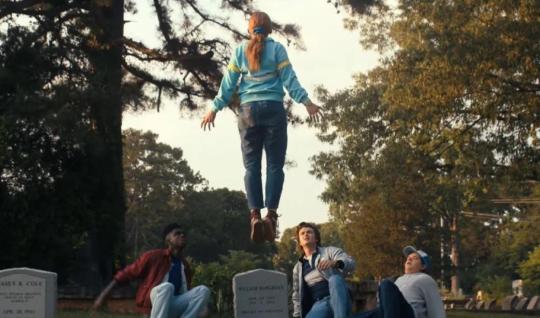
When Eddie said the infamous line in S4, I was like, oh yeah they’re going for it.
Eddie: “It’s forced conformity. That’s what’s killing the kids.”
It’s just so on the nose. It’s the entire message of the show summarized in one line. The way to survive is to accept yourself for all that you are, and to find other who accept you as well. This is exactly what Jonathan said to Will, way back in S2 about how “being a freak is the best!” (ILY Jonathan Byers, best sibling and ally in the whole show <3)
The kids who are targeted by Vecna are traumatized and do not fit into the societal mold, despite their attempts to. Chrissy has mental health issues stemming from an abusive mother and feels pressure to change her body to appease her; Fred has immense survivor’s guilt and is a nerdy outsider; and even though Patrick is popular, it’s implied he lived in an abusive household. As for Max, she’s an outsider for many reasons that I’ve gone over.
Each of Vecna’s targets attempts hide their trauma in order to fit into their expected roles. In their own ways, they are conforming. As Eddie, ever the non-conformist, says: “it’s forced conformity. That’s what’s killing the kids.”
And I think he’s right.
I’ve discussed a lot of the ways the characters don’t fit into typical 1980s society and how the point is for us to empathize with these outsiders and freaks. There’s a reason why seeking popularity is seen as a negative choice (for better or worse), and why accepting your weirdness and refusing to hide yourself is held in high regard.
Vecna’s Victims Attempt to Conform
In fact, we could even argue that Vecna’s victims are targeted because they conform. In a way, it becomes a narrative punishment. Conforming = bad. Characters who conform/hide = targets. Take Max, for example. Max attempts to hide her trauma and depression by pushing away her friends. She’s able to overcome these inner battles and finally comes clean to Lucas and the rest of the party by the end of the season, revealing the parts of herself she attempted to hide.
Similarly, we see the way Will’s attempts to conform put a weight on him, and especially on his relationships. The end of S4 presents a Will Byers who is beginning to accept himself after coming out to Jonathan, but hours earlier he still felt like a mistake for who he is. He probably still feels that way by the season’s end because of how entrenched in internalized homophobia and shame he has been growing up with Supreme Dick Lonnie Byers as a father.
A Brief Note on Lucas
Since S1, we’ve seen the way racism has impacted Lucas as the sole main Black character in the show. From Troy to Billie to Jason, the way Lucas is bullied by racists in Hawkins is important to take note of. For this reason, it’s understandable that Lucas attempts to prevent his othering by conforming and trying to “fit in” by joining the basketball team. We’re not meant to view this as inherently negative, as is the case for most other attempts at conformity. Rather, we’re meant to understand that Lucas doesn’t want to be ostracized further than he is already.
Other analysts have pointed out more specific analysis of race and racism in Stranger Things that deserve their own conversation outside of this post, but I wanted to bring up Lucas’ experience because he’s: 1. our sole Black protagonist, and 2. an example of conformity which isn’t meant to be inherently bad to viewers. We’re supposed to understand Lucas’ choice as a means of survival. Conformity isn’t inherently evil, but his desire to conform paints a larger picture of Hawkins as a place where anyone who stands out of the dominant society is put at risk because of prejudices in the town.
What About Mike?
Mike pushes Will away after S2. He spends all his time around El in S3, conforming into the expected role he has grown up around: seeing his parents, unhappily married in a heterosexual relationship. Others have pointed out just how many parallels there are between Mike and Ted throughout the show, from dialogue to his wardrobe, and this certainly isn’t an accident. Realizing his queerness and seeing nothing but homophobia and heteronormativity, Mike feels the need to conform to his parent’s expectations. He sees no other choice, and this is why he projects onto Will — “it’s not my fault you don’t like girls!”
Even after Mike and Will reconcile at the end of S3, Mike pulls away again when Will moves away. To a smaller extent, Will is certainly at fault. But given his feelings for Mike and the shame he feels, it’s understandable that he tried to keep Mike at a distance. But what excuse would a Straight Mike have?
Mike: “We’re friends, Will. Friends.”
I can practically hear the just in front of his “we’re friends” statement. And to answer my previous question, a happy straight Mike would have no reason to pull away from Will again. He’s not annoyed about Will acting childish — he literally plays D&D (which he called Will childish for playing in S3) while Will does not anymore. Their roles have completely reversed by T4. Will is in the early stages of the self-acceptance we expect from Stranger Things, but Mike is still in denial of his own emotions.

S3 Mike is annoyed at Will for being “childish” and wanting to play D&D, meanwhile S4 Mike only wants to play D&D.
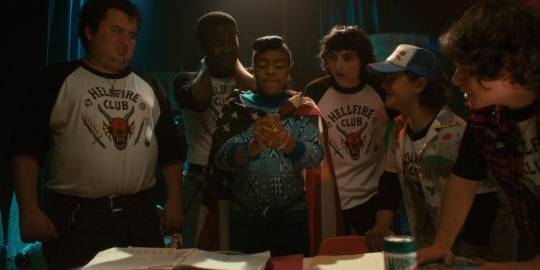
But S4 Mike is beginning to change in small ways.
His wardrobe is influenced by Eddie. He starts to play D&D again. He makes up with Will and this time he seems to mean it, even though their relationship is still strained with everything left unsaid. The couch scene signals a movement back into Mike’s POV. Essentially, S5 will reintroduce us to Mike’s POV, and we’ll begin to understand why he’s been acting so strange since S3. It’s because he loves Will.
El, Friendship, and Found Family
We’ll get back to Heroes and look at the way the song ties up all of the themes I’ve laid out soon enough, but first it’s important to consider El, who is our protagonist from S3 onwards.
One of the largest critiques I see from people who don’t think requited Byler is likely to become canon comes from a segment of people who believe El’s romantic life is a large part of her character arc. I simply disagree with this assessment of her arc, and here’s why!
What about El, what about her love story?
El has a perfectly beautiful love story forming in front of our very eyes. Only for her, it’s the story of a girl who was raised without love or kindness or family, who grows and finds a family for herself. Found family ties into the queer themes in Stranger Things and the idea that all of our main characters are outsiders. It’s the glue that holds the series together. The heart of the show is the love the characters have for each other, platonic and otherwise.
This is one reason why we don’t see endless death of our central characters as is the case in similar shows. That’s because at its core, Stranger Things is about love and acceptance. Sure, there are also monsters and alternate dimensions, but that’s not the core of what holds the story together.
From the first time we meet El in S1, we understand her position. She is deeply traumatized, having grown up in a hostile environment where she was dehumanized and subjected to brutal experiments. Hell, her name is literally a number.
But in S1, she meets Mike.
This is El’s first real and normal connection to any person. Mike treats her like a human being and teaches her about the outside world and the way it works.
In S2, El finds a father in Jim Hopper and learns the ways of a family (and pretends to be Mike’s cousin). She still has her bond to Mike, but the romance isn’t what matters. El is on a journey to discover more about where she came from, including her family and what that says about her powers. At the same time, she’s learning about the outside world and the societal standards that restrict she and her friends.
In S3, El becomes close to Max and realizes that romantic relationships don’t and shouldn’t define her life. There’s more to life than stupid boys! She’s learning about herself and what it means to be a kid and what it means to have a family. She learns to balance her relationships, but she still sees herself as a superhero at the end of the day.
In S4, El has a family. A brother and mother who love her. She struggles with bullying because she’s different from everyone. And again when she goes to get back her powers, she’s on a journey of self-discovery.
For three seasons she’s been treated and believed herself to be the superhero who must save the day. But it didn’t work this time. Max is in a coma and everything is falling to pieces, but she has Hopper and Joyce and Will and everyone who loves her. Her relationship with Mike is turbulent. Even after his monologue, the two of them never discuss their supposed romantic love again. Instead, her relationship with Hopper is prioritized; Mike and Will have their moment on the couch and then everything falls apart again.

Oh yeah. And we get this epic final scene where El stands alone in front of the people who have become her family. Only the six people behind her are arranged in groups of two. And two of those groups are canonical couples who are most likely to be endgame. And then we have Mike and Will. Interesting.
At the heart of El’s character arc is her growing awareness of the world around her and her found family. After a childhood of neglect, trauma, and dehumanization, she’s being treated like a person. Not only that, but she’s learning to love and be loved by those around her. To say that her romantic relationship is central to her character arc is to ignore the true story that is unfolding in El’s life.
Besides, El wasn’t planned to live past S1. I’m so glad she did because she’s a wonderful character, but romance between El and Mike was never the original end goal for the story.
The Healing Power of Music

I promised we’d get back to Heroes eventually!
To overview: the core theme of Stranger Things is learning to accept your differences and status as an “outsider” in the eyes of larger society; not only accepting, but loving these parts of yourself for which you’re made to feel ashamed. And in this, forging a family of outsiders, underdogs, and freaks who understand you and love you as you are.
In the context of Heroes, I discussed how the song focuses on a forbidden romance wherein the couple overcomes their feelings of shame and fear, choosing to embrace their love, even though it’s frowned upon in the eyes of the outside world. What matters isn’t the view of onlookers, but living and refusing to conform to expectations.
By accepting yourself as you are, you’re being born again. You’re resurrected.
S4 may have showed us the literal saving power of music, but music has always been crucial within the show. Just think of Will singing Should I Stay or Should I Go to keep himself safe and comforted in the Upside Down. The way music is used to forge connections and bonds. The way music is used to highlight being a freak: from Bowie as the icon of freaks to Eddie’s “this is real music” and beyond.
Any song that plays more than once over multiple seasons is bound to be important and lauded in meaning. Will listening to Should I Stay or Should I Go represents his fight or flight response when faced with danger, and his choice to be brave. Max listening to Running Up That Hill (A Deal With God) represents her depression and survivor’s guilt; the way she desires to switch places with Billy. When It’s Cold I’d Like to Die plays when Eddie dies, when Sarah dies, and when Will is saved from death.
And as I’ve said already, Heroes has come to represent resurrection. It’s about forging a new life for yourself out of the ashes of trauma and shame. If even for just one day, accept what makes you different, because it’s these differences that make you a hero in the eyes of the show.
So when we get to S5, music will continue to hold its healing power and symbolism, just as it has since S1 when Will first entered the Upside Down and shaped it to his image. I think our final season (which has been said to be similar to S1 in the way the characters are united) will directly parallel S1 in many ways. Including Will’s role. I think he will revisit the Upside Down and confront his trauma and fear as Bob taught him to.
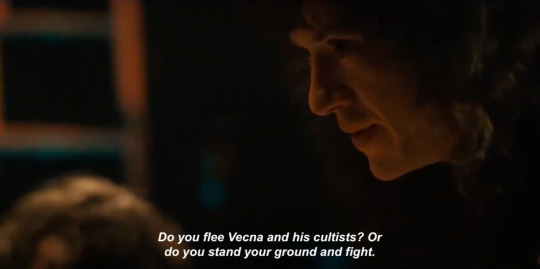
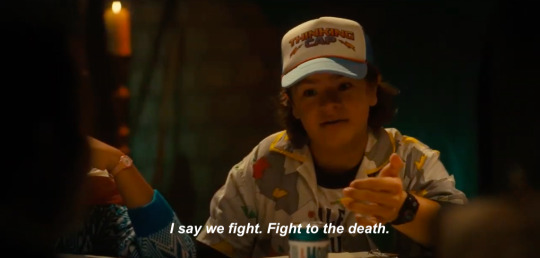
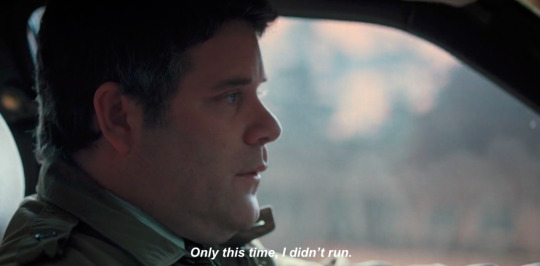
This being said, I think Heroes will make an appearance again.
Think of it: it played during S1, S3, and we have S5 left. How perfect would it be for the song to play during a moment of two characters defying all odds, casting aside their shame and guilt, choosing acceptance and love instead. I’m thinking S5 will have a post-apocalyptic feel, with Hawkins abandoned by many, and only our heroes left to save their town. They’ll be surrounded by the violence and decay of a Hawkins morphed with the Upside Down, and larger society’s pressure will cease to matter.
This is life or death. Our characters must be the heroes we’ve always known them to be, or else Vecna will continue to expand and claim innocent lives. And part of this journey is self-acceptance, just as it always has been. Our characters have to accept the things that make them different, otherwise they won’t survive. Conformity is what’s killing the kids. Nobody normal ever made a difference in the world. They have to be Heroes, just for one day.
Dear Underdogs, Outcasts, and Freaks
One of the things I’ve always loved about Stranger Things is the way it subverts expectations and rewrites 1980s nostalgia through a modern lens. If it came out in the 80s, the show would look so different. We certainly wouldn’t have any of the (still very limited) representation the show has today.
All of this is to say that thematically, the ending which makes most sense is for Mike and Will to end up together. It would defy expectations, yet the clues have been written on the wall since S1. All general audience viewers will have to do is re-watch the show after a requited Byler reveal to see just how many hints have been there all along. They’re already revisiting the show with fresh eyes after Will has been canonically confirmed to be gay (something many Bylers have known since S1).
The Duffer brothers have even stated in multiple interviews that they aren’t worried about the general audience reception to the series’ end. They know that some people will be angry, but the story they’ve been telling is so much bigger than that. The cast has described the ending as beautiful. What’s more beautiful than revealing you’ve been playing the long-game in what would be one of the most revolutionary representations of queer love in any piece of mainstream media?
Stranger Things is a love letter to everyone who has ever felt like they don’t belong. To the underdogs, outcasts, and freaks. From a writing and queer representation perspective, it simply makes no sense to have a deeply traumatized gay boy end up alone. There’s a reason Robin is being given a love interest for the final season. The Duffer brothers love happy endings for their outcast characters.
All of these ideas are shown in the song Heroes, which is about choosing love in the face of ostracism and violence. Very much an idea which we see throughout the series. Because at its heart, Stranger Things is a show about finding family and love in a broken world. What would be more perfect than to end the series with Mike and Will finally accepting themselves and overcoming everything they’ve dealt with since November 1983?

Author’s Note
This post has taken me ages to put together, but here we are, at the end!
I recently read the theory behind Flickergate and I find it wholly convincing. It also fits with my theory that Heroes will play a large symbolic role in S5, so I recommend reading that theory or watching the linked visual.
I’ve also linked some of my own theories throughout this one which give a bit more context to some ideas I have about Stranger Things at large. They’re also linked in my pinned post.
If you have questions or add-ons for this, please share them, I’d love to know your thoughts!! :)
—Em
#the heroes theory#byler analysis#byler is endgame#heroesgate#byler#stranger things meta#byler meta#stranger things#stranger things theory#st5 theory#st5 prediction#byler theory#byler is requited#will byers#mike wheeler#st analysis#vecna's curse#music is the cure#stranger things analysis#st5 predictions#st5 analysis#redshoes-blues
369 notes
·
View notes
Text
Hey! Strap in guys, it's byler music analysis time.
So, was somebody going to tell me that Being Different (from the van scene) and The First Lie / The First I love You ARE FUCKING IDENTICAL TRACKS??? OR WAS I JUST SUPPOSED TO LEARN HOW TO EDIT AUDIO TO FIGURE THAT OUT MYSELF???
LISTEN TO THIS!!!!
youtube
youtube
I thought they sounded similar, but I had no idea that mixing them would give me something this amazing. I didn't do any editing to these tracks other than adjusting the tempo, balancing the volume, and clipping off the ends.
So then you're telling me the track that plays while Will is pouring his heart out to Mike in the van. It syncs up perfectly with the track that plays when Robin comes out to Steve? With the track that plays when El tells Mike she loves him for the first time? With the track that plays when Jonathan and Nancy first get together?? That these songs and their associated scenes are clearly and deliberately tied to themes of romance and/or queerness in every instance, and that the result of mixing the songs together is something agonizingly beautiful, like they complete each other, like they were meant to be the other half of the words left unsaid? YOU'RE TELLING ME that the names of these songs are The First Lie, The First I love You, and Being Different?
excuse me while I go into cardiac arrest. ahem.
It's a through-thread that's impossible to ignore once you see it. Idk about you, but my third eye is wide fucking open right now and all it sees is byler endgame and a kiss scene in the pouring rain as a final variation of these tracks swells in the background, finally complete with all its parts in sync, finally with its full potential realized, finally seeing this arc to its well-deserved conclusion. Somebody sedate me I'm going insane.
(Some extra rambling about combining the tracks under the cut)
Being Different has, from what I can tell, three distinct segments if you listen to the original. The track starts off with these long, droning tones, slowly building in intensity as time goes on. Then, around the 1:10 mark, the second segment introduces the melody of eight (four? sixteen? idk, however you want to count it) repeating notes that originally tipped me off to its similarities with the other two tracks. (Just listen, you'll hear it!) This is the segment that I used in the mashups. At 2:32, that melody is suddenly overtaken by some audio distortion and reversed instruments, and fades out to leave us with the rest of the song.
So since the tracks are drastically different lengths, I had to cut off the beginning & end of Being Different, because The First Lie / I love You matched best only with that middle section. Just fyi.
But other than that, what you see is what I did, nothing more. I cannot stress that enough. Go listen to each of the songs on their own, and then come back and realize that I didn't splice anything, I didn't go in and sneakily add a couple extra bars to either track. They just work like that.
It's literally "yeah you can copy my homework just don't make it too obvious" levels of subtlety going on here. Same key, same number of repetitions, the way it's not just a parallel it's a PERFECT COPY- they go quiet and then crescendo and switch between variations of the melody at the same time and I am losing my mind.
If I'm remembering this correctly, The First I love You was a bit too long, so I had to trim off a part of the end in order to prevent it from spilling past the threshold of the second segment of Being Different. But The First Lie specifically was EXACTLY as long as that segment. Note-for-note. Like they just took The First Lie, without cutting it down at all, reworked it a bit, added some extra stuff on the ends, and put it in the van scene. To tell you I was flabbergasted does not come anywhere close to the reaction I had when I realized how well these tracks fit together.
And a little something I noticed while I was looking for a good version of each of the songs to use- The First I love You, from El's love confession scene to Mike in season 3, pay attention and you'll see that "love" is never capitalized in the title of the song. Not on Spotify, not on Youtube, not on Wikipedia, I couldn't find a single official source that capitalized "love", which is WEIRD because all the other songs have consistently capitalized every word in their titles! I'll leave you to draw your own conclusions from that but all I'm saying is... I'm pretty certain it was on purpose. Do with that information what you will.
#there's no way i was the first person to mix these tracks#right??#there's NO way#but i've never seen anyone bring this up before#and it's such a monumental piece of proof#anyway i've been chased away from ST reddit so hi guys i'm here now#seriously stay away they are out for blood and will gleefully disembowel any unassuming byler they find#i tried to post one of the track mixes with the simple caption:#Mashup between The First Lie (Season 2) and Being Different (Season 4)#AND THE MODS REMOVED IT DJFHDSKFHDJ#they didn't specify a reason#only AFTER i pushed they said it was for the watermark & link at the corner of the video#which does technically break one of the rules... even though the point is to prevent self promo... which i was not doing LMAO#byler analysis#byler proof#byler music#mike wheeler#will byers#stranger things#byler#soundtrackgate
40 notes
·
View notes
Text
Stranger Things and...Sweeney Todd?
Now I know we all giggled at hot-wheelz's Will-Henry Johanna video...but I want to introduce you all to a realization I had:
Henry is first Johanna, here, then Sweeney Todd.
Brief overview of the relevant parts of Sweeney Todd:
Judge Turpin frames Benjamin Barker for crimes he didn't commit for the sole purpose of stealing Benjamin's wife and daughter for himself. Benjamin Barker is imprisoned for many years, as is his infant daughter, Johanna. His wife, Lucy, (pretty, blonde) is presumed dead by Barker.
Barker is in prison, but Johanna (also pretty, blonde)? She's imprisoned in her room for many years as Judge Turpin's ward, aka...his adopted daughter. Judge Turpin, however, has plans to marry Johanna now that she's grown. When she refuses, planning to elope with Antony Hope, Turpin has her put in an insane asylum, and her release is conditional on her repenting and agreeing to marry him. She escapes the asylum with Antony's help, but she tells him the ghosts of what has happened to her will never go away.
Barker is driven mad by grief and desire for revenge, and becomes Sweeney Todd, who teams up with Mrs. Lovett to go on a cannibalistic murder spree. He does this in hopes of killing Judge Turpin as justice for his crimes, but also to prevent what happened to him and his family never happens again, regardless of how many die in the process. In fact, Sweeney Todd revels in the murder.
Based on recent revelations re: the night of the Creel Massacres...let's put it in context:
Dr. Martin Brenner frames Victor Creel for the murder of his own wife and children, crimes he didn't commit, for the sole purpose of stealing Victor's son for himself. Victor is imprisoned for life, as is his son, Henry. Victor's wife, Virginia, (pretty, blonde) is dead.
Victor is in prison, but Henry (also pretty, blonde)? He's imprisoned in Dr. Brenner's lab for many years as his test subject and pseudo-son. Dr. Brenner has a questionable relationship with Henry, particularly before he's grown. Eventually, Henry tries to escape with Eleven, his pseudo-sister. However, given that his escape is too violent for Eleven's tastes, Henry is sent into the hell dimension until his inevitable and accidental release in 1983.
He is haunted by the ghosts of what has happened to him, which drives him to murder. He teams up with the Shadow Monster to go on a murder spree which he hopes will create a world where nothing like this ever happens to him again, regardless of how many die in the process. He seems to revel in the murders.
This is where we get into Stranger Things' cyclical narrative, in which Henry becomes the Sweeney Todd and Judge Turpin of his own/Will's story.
#stranger things and musicals...always overlapping#i also think Will Byers would be a Sweeney Todd fan#henry creel#henry/vecna/001#victor creel#st analysis#film analysis#sweeney todd (2007)#stranger things
14 notes
·
View notes